


Cancer relevant training and education programs and early career support

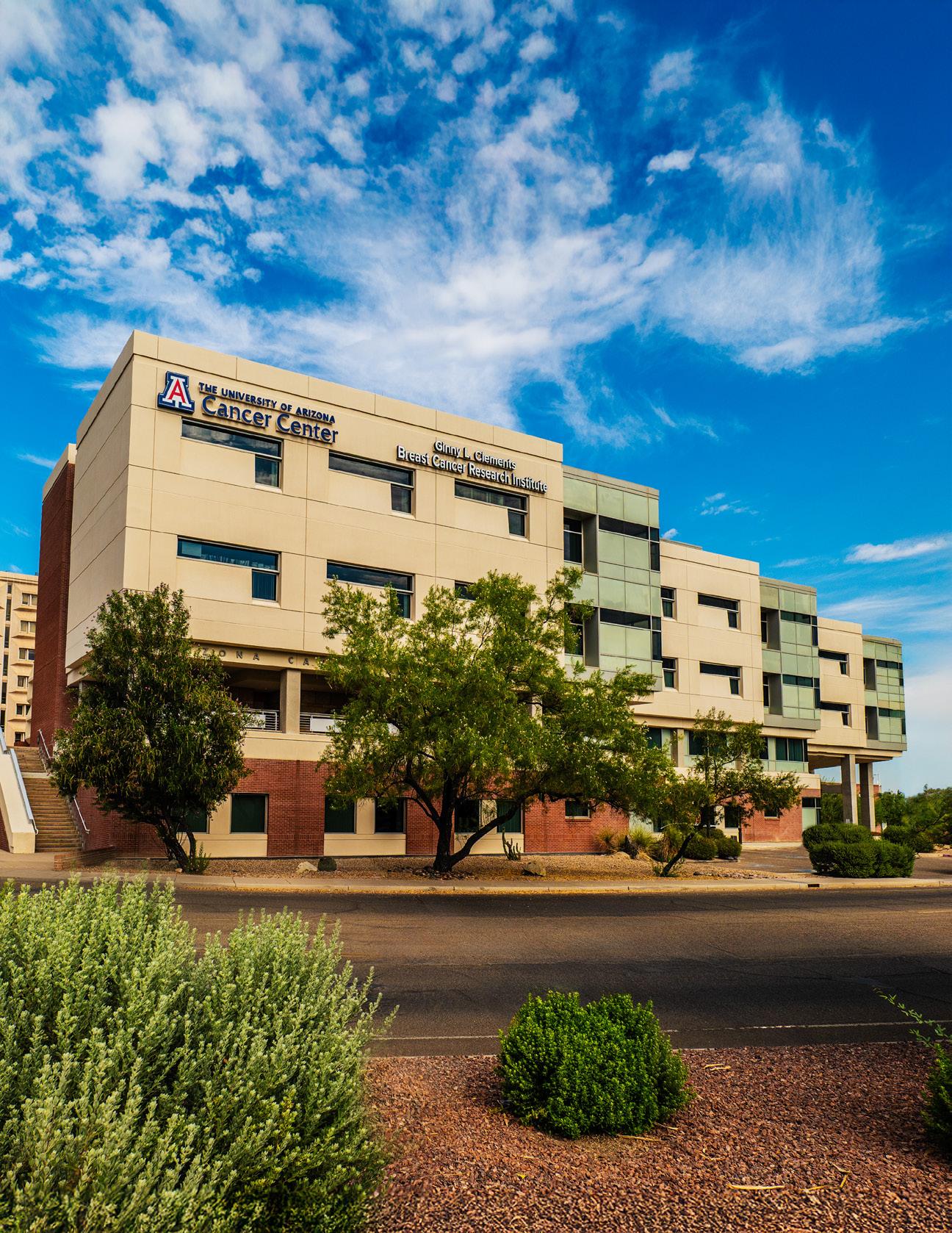






Cancer relevant training and education programs and early career support




We respectfully acknowledge the University of Arizona is on the land and territories of Indigenous peoples. Today, Arizona is home to 22 federally recognized tribes, with Tucson being home to the O’odham and the Yaqui. The University strives to build sustainable relationships with sovereign Native Nations and Indigenous communities through education offerings, partnerships, and community service.
The following booklet contains an introduction of the University of Arizona Cancer Center and a collection of cancerrelevant support programs available at the University of Arizona to students at any level as they begin their journey into a cancer research or oncology career as well as programs that support early-career faculty and clinicians as they embark on independent cancer research and care.
Some of the programs outlined below are only available in specific locations, while others are offered statewide and others virtually. All programs have an icon indicating where they can be accessed, according to the following legend:



Tucson-metro

Phoenix-metro
Student programs that are cancer specific are tagged with a red banner, noting it as a . Cancer Specific Program
Programs operated by University of Arizona Cancer Center offices and members are also highlighted with the following boxes around the program information:
CRTEC PROGRAM
SCI PROGRAM
NACP PROGRAM
UACC PROGRAM
Program is operated by the Cancer Research Training and Education Coordination office
Program is operated by the Skin Cancer Institute office
Program is operated by the Partnership for Native American Cancer Prevention
Program has a Principal Investigator who is a cancer center member or is supported through University of Arizona Cancer Center funding
In addition, some programs listed within this booklet are available to both University of Arizona students and students enrolled at other institutions. Look for the following icon in the margins of the sections for Undergraduate & Post-baccalaureate Students as well as the section for Graduate & Medical Students:
Program available to both students enrolled at the University of Arizona and those not enrolled at the University of Arizona
The University of Arizona Cancer Center (UACC) is the only National Cancer Institute (NCI)-designated Comprehensive Cancer Center headquartered in Arizona. UACC is creating defenses against disease and is located within the University of Arizona Health Sciences (UAHS) campus in Tucson. UACC aims to alleviate the burden of cancer in Arizona, particularly in communities disproportionately affected by cancer. UACC is a regional resource and national model for overcoming cancer risks, improving treatments through transdisciplinary discoveries, training talented scientists and providers, and engaging communities though a shared determination to discover, innovate, and improve health equity. The center has Banner – University Medical Center, Tucson as its clinical affiliate in Tucson, and it operates local outpatient clinics. Founded by Sydney Salmon, a physician who served from 1976 until 1999, UACC received its first NCI Cancer Center Support Grant in 1978 and was designated a comprehensive cancer center in 1990.
UACC works with researchers across the University of Arizona campus to facilitate coordination and integration in cancer research through membership in three research programs: Cancer Biology (CBP), Cancer Prevention and Control (CPCP), and Clinical and Translational Oncology (CTOP). Members come together to work on joint projects, grants, and publications while utilizing cancer-related shared resources housed at UACC.
UACC strives to improve cancer research through three research programs and our clinical trials office, and aims to incorporate community voice through the Community Outreach and Engagement (COE) office, and supports exceptional training opportunities through the UACC Shared Resources.
UACC supports students and trainees through the Cancer Research Training and Education Coordination (CRTEC) office. CRTEC offers trainee programs, grant and award initiatives, and mentor support for students interested in pursuing cancer research and/or oncology medicine.
Trainees and students are involved at every level of UACC. In addition to involvement in research and laboratories within our component offices, trainees are invited to attend events and conferences to further their educational and career goals.
The CRTEC office supports trainees directly by offering programming through multiple American Cancer Society (ACS) funded training programs and three grant writing support programs, as well as hosting lectures and workshops.
To connect with trainees across the University of Arizona, the CRTEC office offers trainee membership. Trainee membership is free and offers access to exclusive informational and professional development events, recognition of outstanding presentations and publications through the Cancer Center's newsletters and social media, access to present posters at Cancer Center events, and access to the CRTEC offices variety of programs, listed in the following pages of this brochure.
Interested in applying for trainee membership? Follow this QR code:
As the son of two educators, the importance of learning was established for me early in life, and I’ve promoted educational activities as much as possible everywhere I’ve worked. As a cancer center director in Colorado, I supported training that eventually led to a T32 in Cancer Biology, and while leading Cedars-Sinai Samuel Oschin Cancer Center, I initiated their Cancer Research Training and Education Coordination program with key recruitments. On a more personal level, I am the director of the Convergence Science Virtual Cancer Center, a Department of Defense sponsored grant aimed at mentoring early-stage investigators throughout the country. More information about that can be found at CSVCC.org.
In my role at the University of Arizona Cancer Center as its director, I carry the same passion for education, and I believe it’s foundational to progress in research, patient care, and community health. As a National Cancer InstituteDesignated Comprehensive Cancer Center, we are committed to training the next generation of scientists, clinicians, and public health professionals who will lead the fight against cancer.
The training experience at the University of Arizona Cancer Center offers access to world-class shared resources, cutting-edge laboratories, and collaborative training programs. Led by faculty with expertise from across the biomedical research spectrum, our educational programs provide a unique, multidisciplinary experience that spans basic cancer biology, clinical and translational oncology, and cancer prevention and control.
Through graduate and postdoctoral research opportunities, medical education, and community-based initiatives, our cancer center fosters a learning environment that translates discoveries into meaningful improvements in cancer prevention, diagnosis, and treatment.
In conclusion, I invite you to explore the full spectrum of educational opportunities available at the University of Arizona Cancer Center. We’re fully committed to a comprehensive program with a lot to offer. Your contributions as a student, researcher, or community advocate are welcome and vital to advancing our shared mission of eradicating cancer and improving lives.
Sincerely,

Dan Theodorescu, MD, PhD
Director, University of Arizona Cancer Center
Professor of Urology and Cellular and Molecular Medicine
Nancy C. and Craig M. Berge Endowed Chair
In today’s world, cancer touches all our lives in some way. As advances in medicine continue to extend our years of healthy living, the likelihood of encountering cancer at some point increases. This makes the need for those training to understand, control, and ultimately eliminate this disease greater than ever.
At the University of Arizona, cancer research is an exciting and dynamic field of discovery. Our University of Arizona Cancer Center includes over 160 faculty members whose research spans the life sciences and beyond— from studying tumors in fossils and bioengineering to exploring cancer’s impact on mental health, communities, and populations both in Southern Arizona and globally. Breakthroughs in biology at the chemical and molecular levels are leading to the treatments of tomorrow. Our team of translational scientists, oncologists, veterinary oncologists, and nurses are bringing these discoveries to life in clinics with support from practitioners of both traditional and integrative medicine.
UACC is a comprehensive cancer center focused not only on treatment but also on community outreach, research, and discovery. As the only comprehensive cancer center headquartered in Arizona, and one of just 54 in the United States designated by the National Cancer Institute, we are committed to advancing cancer research and care.
The Office of Cancer Research Training & Education Coordination (CRTEC) supports the development of current and future scientists, from K-12 students to early-career faculty. Our programs are designed to help you expand your knowledge and advance your career. Trainees mentored by UACC faculty gain UACC trainee membership, with access to fellowships, travel awards, and recognition that will promote their accomplishments across academic audiences and the broader community.
In 1896, Emil Grubbe, a Chicago medical student, became the first to treat a breast cancer patient with radiation, marking the first documented use of radiation to treat cancer. Today, nearly half of all cancer patients—about 10 million annually—receive radiation therapy, including two-thirds of breast cancer patients. At UACC, our trainees have the opportunity to make similarly transformative discoveries as they develop their skills and knowledge.
The CRTEC office is your partner wherever you are on your academic journey. We invite you to connect with us and explore the opportunities that await you here at UACC and across Southern Arizona.
Bear down on cancer!

Jacob C. Schwartz, PhD
Associate Research Professor, Pharmacology, College of Medicine
Associate Director, Cancer Research Training & Education (CRTEC), University of Arizona Cancer Center
Interested in becoming a Trainee Member of the Cancer Center? Apply today!
Membership is free and connects trainees interested in pursuing careers in cancer research and care to support programming and events hosted by the Cancer Center. Questions? Reach out to the CRTEC team at uacc-crtec@arizona.edu.
The future of cancer care is in our hands, and the next generation of scientists, researchers and clinicians will play a pivotal role in shaping its future. As groundbreaking advancements and novel therapies emerge, they rely on more than just scientific expertise—they depend on passion, commitment, and the collective support of those who believe in our mission. By partnering with us to support the programs shaping the future of cancer research, you can help create pathways to progress that will have a lasting impact on the lives of those affected by cancer. Together, we can nurture the students and leaders of tomorrow, empower the next wave of breakthroughs, and ensure that this vital work continues on a global scale.
We invite you to be part of this transformative movement. Learn more about how your philanthropic support can drive meaningful change. Consider partnering with us to help fuel innovation, and the future of cancer research, ensuring a lasting legacy of hope and progress for generations to come. Together, we can make a world of difference.
Please contact:
Elaine
Cunningham
UACC Sr. Director of Development
Email: elainecunningham@arizona.edu
Phone: 520-626-7130



Dan Theodorescu, MD, PhD
Associate and Administrative Directors



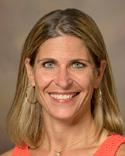

Teri Bankhead, MA
Interim Associate Director, Administration

Gloria Coronado, PhD
Associate Director, Population Science
Jenna Hatcher, PhD
Associate Director, Community Outreach and Engagement

Elizabeth McPeak, MPH
Administrative Director, Clinical Research
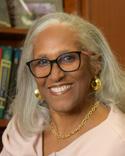
Taylor Riall, MD, PhD, FACS
Associate Director, Oncology Services

Ronald M. Lynch, PhD
Associate Director, Shared Resources
Juanita Merchant, MD, PhD
Associate Director, Basic Sciences
Rachna T. Shroff, MD, MS, FASCO
Associate Director, Clinical Investigations
Jacob C. Schwartz, PhD
Associate Director, Cancer Research Training and Education Coordination
UACC has three established scientific research programs that work together to accomplish the center’s mission and cure cancer. Scientists and cancer care practitioners from across the University of Arizona participate in the research programs as members, coming together to share ideas and build upon research to drive innovation.
The Cancer Biology Program (CBP) has a primary research focus of discovering and understanding how cancer works at the most fundamental levels in order to devise approaches to cure and prevent cancer. CBP’s research is critical for the identification of targets against which new chemotherapeutic compounds can be developed, the creation of new tests for early detection of cancer, and the discovery of biological markers for diagnosis and prediction.
CBP research focuses on three themes concentrating on the major features of cancer:
• Discovering the basic mechanisms that control tumor-relevant cell growth and proliferation
• Identifying etiologic mechanisms in cancer initiation and progression
• Determining how the tumor microenvironment influences progression, invasion, and metastasis
CBP creates a welcoming environment for trainees of all levels through mentoring support within member laboratories, providing much-needed research experience within basic science laboratories.
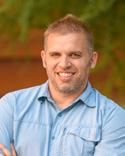
Koenraad Van Doorslaer, PhD
Co-Leader, Cancer Biology Program
The goal of the Clinical and Translational Oncology Program (CTOP) is to bring together basic and clinical scientists to transform scientific discoveries into clinical applications. CTOP collaborates with pharmaceutical companies and academic investigators to evaluate the mechanisms of action of novel anticancer drugs and their efficacy in preclinical and clinical studies.
CTOP has significant collaborative efforts with CRTEC to promote education and training. CTOP members lead education programs at all levels ranging from high school to junior faculty. Our members lead the NIH T32 funded Integrative Cancer Scholars (ICS) program for predoctoral students, an ASCO Oncology Summer Internship (OSI) for medical students, and two NIH R25 training grants, one for high school students regarding neuro research and one for undergraduates on biomedical engineering that partners directly with the Undergraduate Biology Research Program (UBRP). By supporting trainees from high school through graduate school, CTOP is excited to mentor the next generation of clinicl and translational scientists.

Steffan Nawrocki, PhD
Co-Leader, Clinical and Translational Oncology Program

Aaron J. Scott, MD
Co-Leader, Clinical and Translational Oncology Program
The Cancer Prevention and Control Program (CPCP) aims to reduce cancer rates and related burdens through highly collaborative, multidisciplinary team science. Unique among UACCs scientific programs, CPCP fosters partnerships among basic, translational, clinical, behavioral, and population scientists who develop and implement novel strategies across the cancer continuum, conducting research that spans the full spectrum of primary, secondary, and tertiary cancer research.
CPCP research focuses on three major themes:
• Discovery: Advancing understanding and early detection of cancer through identification of risk factors, development of detection biomarker and imaging technologies
• Intervention: Evaluating novel cancer preventive agents and strategies to reduce the cancer burden
• Dissemination and Implementation: Implementing evidence-based behavioral, psycho-social, and system-level programs to promote health and improve outcomes
CPCP supports undergraduate and graduate students with the Student Transformative Experiences Progress Undergraduate/Graduate Professionals (STEP-UP) and Native American Cancer Prevention (NACP) Research Education Core (REC) programs, postdoctoral scholars with CPCP’s T32 Fellowship Program, and early-stage investigators with the NACP Guiding U54 Investigator Development to Sustainability (GUIDeS) shared resource. By offering a wide range of support through research experience, mentoring, and career exploration, CPCP welcomes trainees to the cancer field.

Jennifer W. Bea, PhD
Heidi Hamann, PhD Co-Leader, Cancer Prevention and Control Program Co-Leader, Cancer Prevention and Control Program

Bringing promising new therapies from the laboratory to the bedside is a high priority at UACC. Through the Clinical Trials Office (CTO), a team of researchers, clinicians, and support staff make it possible. Clinician scientists are consistently engaged in hundreds of clinical trials, investigating a broad spectrum of new diagnostic, prevention, and treatment strategies.
The CTO is dedicated to advancing high quality clinical trial research in accordance with UACC’s educational, research, clinical care, and community service mission. The CTO is responsible for the administrative, regulatory, and institutional requirements to establish and conduct clinical research which is supported through contracts with private industry and other entities.
The CTO provides support to researchers and serves as a central resource for U of A faculty, staff, and departments involved in cancer clinical trials research while also supporting sponsors seeking to conduct cancer clinical trials at UACC.
The CTO team is integral in ensuring that cancer clinical trials provide high quality care while ensuring scientific integrity and ethical conduct in all clinical trials. CTO staff provides support in:
• Assistance and consultation in developing investigator initiated trials (IITs) as well as supporting ongoing management
• Assistance in resolving issues related to clinical trials
• Project review groups including Scientific Review and Data & Safety Monitoring Review
• Education and training regarding requirements for operational conduct of clinical research at UACC
• Research support services for clinical trials opened with clinical partners
• Oversight and assistance with registration of clinical trials
• Compliance with posting results with clinicaltrials.gov, when appropriate
• CTEP renewal and NCI’s National Clinical Trials Network participation
• New Investigational New Drug (IND) and Investigational Device Exemption (IDE) submissions
The CTO office employs a team of 60+ individuals that include research data coordinators, budget specialists, regulatory coordinators, laboratory managers, administrators, and many more. Managing and supporting clinical trials takes effort from many different areas of expertise, which the CTO celebrates.
If you or anyone you know needs more information on what cancer clinical trials are currently available or need support due to a cancer diagnosis, please visit the Patients section on the UACC website: cancercenter.arizona.edu/patients.
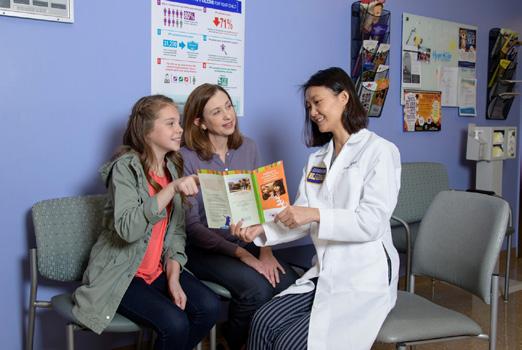
UACC’s Community Outreach and Engagement (COE) office connects UACC to communities in Arizona to ensure excellence in culturally relevant cancer research, prevention, and treatment. COE focuses on:
• Facilitating recruitment into clinical trials
• Research outreach through community assessments
• Health disparities unique to Southern Arizona
• Community education through events, forums, and activities across the state
Connecting science to the community is a pivotal aspect of research, ensuring that studies meet the needs of the community they intend to serve. COE facilitates discussions of scientific advancements between researchers and groups with first-hand experiences that maintain the connection between research and practice.
The overarching vision for COE is to build sustainable partnerships between UACC and communities for a cancerfree Arizona. This vision can only come to fruition when working with students and trainees at every career level. COE works with student workers to build the work experience of current university students. Principal Investigators (PIs) are encouraged to bring students and trainees from their labs and research programs to the Research Outreach for Southern Arizona (ROSA) Café series, a program within COE that focuses on bidirectional communication between scientists and the community, providing a solid avenue to build a foundational understanding of the importance of working with and listening to the community as an integral step of scientific research.
There are many career pathways within cancer research and oncology medicine, as well as roles facilitating community education, advocacy, research-community connections, and more. The COE office is excited to show trainees how they can make a difference in cancer research, outreach, and education by working directly with the community.
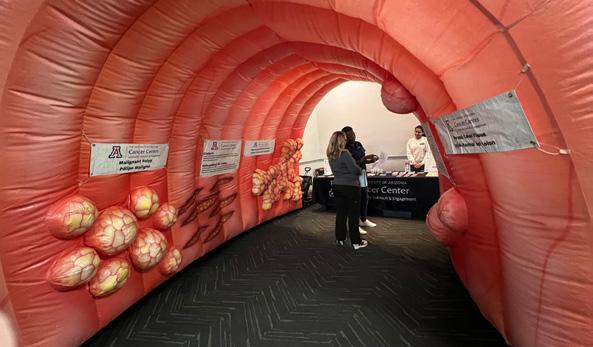
To serve the research needs of cancer center member researchers, scientific research at the university, and the nonacademic research community, UACC currently hosts seven shared resources.
cancercenter.arizona.edu/researchers/shared-resources/analytical-chemistry
The Analytical Chemistry Shared Resource (ACSR) provides investigators with centralized resources and expertise in performing analytical chemistry assays and pharmacokinetic (PK) and pharmacodynamic (PD) data analysis and interpretation. The ACSR has accumulated considerable experience in quantitative analysis of small molecules (<1,500 daltons) in biological specimens. The ACSR is capable of providing integrated PK service from the study design stage through quantification of drug levels to PK/PD data analysis. In addition, the ACSR has developed the capabilities to support targeted metabolomics analysis and untargeted metabolomics profiling.
The ACSR has continued to build its repository of analytical assay protocols, many of which can be readily applied to new projects, and thus the ACSR is able to support a broad spectrum of research projects in a cost-effective manner and with a rapid turnaround time. By continuing to provide state-of-the-art analytical chemistry and pharmacokinetic services, the ACSR laboratory greatly augments pre-clinical drug discovery efforts, stimulates the incorporation of pharmacokinetic endpoints in clinical trials, and facilitates biomarker analysis in cancer prevention and control research.
To learn more about the ACSR’s specific services and to see a list of available assays, please visit the ACSR website.
cancercenter.arizona.edu/researchers/shared-resources/behavioral-measurement-and-interventions

The Behavioral Measurement and Interventions Shared Resource (BMISR) supports researchers studying human lifestyle behaviors (e.g. diet, physical activity, sleep, tobacco use, sun exposure) spanning the cancer continuum. The BMISR provides innovative approaches to investigator needs, offering a large team of trained bilingual student research assistants to collect data, specialized staff to design and manage data in REDCap, and co-directors to serve as consultants.
The BMISR offers training, instruction, and services related to subjective and objective measurement tools (e.g., patientreported outcomes, physical function, diet recalls, body composition, actigraphy) and behavioral intervention (e.g., standardized health coaching, short message series). A broader list of tools and services can be found on the BMISR website or by contacting the BMISR. The BMISR provides in-depth training to undergraduate and graduate trainees as student interns in exchange for course credit and/or recognition as volunteers.
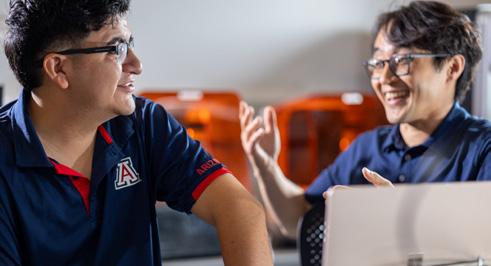
cancercenter.arizona.edu/research/shared-resources/biospecimen-services
The Biospecimen Services core provides central support for researchers needing tissue materials for research, providing mechanisms to simplify and streamline processes of research tissue accrual and disbursement. The core works directly with Banner – University Medical Center to collect tissue from every cancer patient receiving surgery. The tissues are collected and stored through the Biospecimen Services and distributed to cutting-edge cancer research labs both at the U of A and to outside collaborators. The Biospecimen Services at UACC ensures that tissues are effectively utilize to drive forward the research to find treatments for cancer.
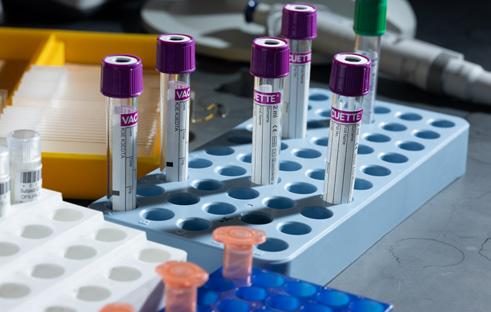
cancercenter.arizona.edu/researchers/shared-resources/biostatistics-bioinformatics
The Biostatistics and Bioinformatics Shared Resource (BBSR) at UACC brings together expertise in experimental design, statistical analysis, genomic and proteomic analysis, biologic pathway analysis, clinical trials, statistical computing, and database applications.
In 2020, the Bioinformatics Shared Resource was combined with the existing Biostatistics Shared Resource to create a cohesive team that can provide a single framework for all quantitative aspects of a study, including rigorous integration of statistical design and ‘omics data analysis. The BBSR provides efficient statistical design, accurate data management, appropriate data analyses and interpretation, and state-of-the-art innovations in statistical design and multiomic data modeling, to ensure investigators achieve their scientific goals.
To learn more about BBSR’s services, expertise, and availability, please visit BBSR’s website.
cancercenter.arizona.edu/researchers/shared-resources/experimental-mouse
The Experimental Mouse Shared Resource (EMSR) offers a continuum of services including initial consultation and in vivo experimental design, Genetically Engineered Mouse (GEM) production, cancer cell line creation using the CRISRP/ Cas9 technology, rodent experimentation and data analysis. The EMSR enables the investigator to generate and use rodent models of cancer to their fullest potential, utilizing the service’s extensive knowledge and expertise to develop cancer therapies that are efficient, cost effective, and clinically relevant.
The EMSR is a full-service facility, that performs pre-clinical experiments in a wide variety of in vivo and in vitro cancer models. The team provides technical and scientific expertise in modeling of cancer disease and assists in developing efficient, cost effective, and clinically relevant drug therapies.
To learn more about EMSR’s services and how to inquire about availability, visit EMSR’s website.
cancercenter.arizona.edu/researchers/shared-resources/flow-cytometry
The Flow Cytometry Immune Monitoring Shared Resource (FCIMSR) at UACC provides access to state-of-the-art instrumentation for flow cytometry data acquisition, analysis, and cell sorting, and the technical expertise to interpret results and develop methods as well as cutting edge services for advanced multiomic and high-dimensional immune profiling for both human and mouse samples. The FCIMSR offers information on new techniques and applications of flow cytometry and immune monitoring through workshops and seminars, and provides hands-on one-on-one training to interested facility users who wish to run their own samples.
Flow cytometry is a powerful tool that measures the functional and structural characteristics of heterogeneous mixtures of cells and particles in suspension based on their ability to scatter light. The cell sorting function separates these cells physically into their different classes. Researchers have the capability to analyze and sort cells by differences in physiology, metabolism, morphology and other characteristics. The ability to distinguish different cell types is limited only by the ability to attach specific fluorescent markers to the cells. Immune monitoring services include comprehensive immune profiling, sample preparation, clinical trial support, and spatial molecular profiling. For a full list of our services please visit our iLab page.
The mission of the FCIMSR is to provide comprehensive flow cytometry, cell sorting, and immune profiling services to advance basic and translational research. To learn more about FCIMSR services, operating procedures, and availability, visit the FCIMSR website.
cancercenter.arizona.edu/researchers/shared-resources/tissue-acquisition-and-cellularmolecular-analysis
The Microscopy Shared Resource (MSR) is an advanced microscopy facility located at UACC. As a Nikon Center of Excellence, the MSR provides several advanced instruments and services for all researchers, including confocal microscopy, super-resolution microscopy, slide scanning, live cell imaging, multiphoton and intravital imaging, advanced image analysis, and much more.
The MSR has six advanced Nikon microscopes with Nikon NIS Elements image acquisition and analysis software allowing for continuity between instruments and a shared hardware and software experience for all users. In addition, MSR provides the following services:
• Instrument training
• Imaging services including consultation and experimental design
• Image analysis services including training, development, and full analysis services
For information on how to work with MSR, including training on how to use their microscopes, visit their website.
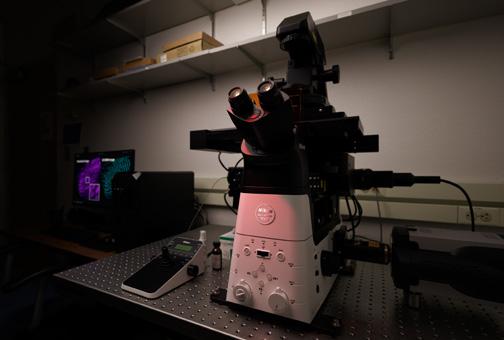
cancercenter.arizona.edu/researchers/shared-resources/tissue-acquisition-and-cellularmolecular-analysis
The Tissue Acquisition and Cellular/Molecular Analysis Shared Resource (TACMASR) is integrated into UACC and provides support for studies related to advancing our understanding of the pathogenesis of cancers for the successful prevention, control and therapy of disease. TACMASR strives to support investigator research endeavors through customized, cost-effective, and quality-controlled histology and organoid culture services.
Visit the TACMASR website for more information or to inquire about the availability of specific services.
(CP-CTNet)
cancercenter.arizona.edu/researchers/collaborative-research/cancer-prevention-clinical-trials-network
The Cancer Prevention Clinical Trials Network is a partnership between the University of Arizona Cancer Center and 12 affiliated organizations working together to perform early-phase clinical trials to determine potential agents that may be further developed for cancer prevention. The CP-CTNet is funding through the NCI and is one of five such networks in the country. The network works with those at risk of developing various cancers on potential preventative measures such as repurposed approved drugs and more.
To learn more about CP-CTNet's work and if there are any open prevention clinical trials, see the CP-CTNet website.
cancercenter.arizona.edu/about/ginny-l-clements-breast-cancer-research-institute
The Ginny L. Clements Breast Cancer Research Institute (GLCBCRI) is dedicated to advancing the fight against breast cancer through innovative, cutting-edge research, with the goal of providing unparalleled care and improving outcomes for patients in Arizona and beyond.
Established in 2020 through a transformational gift from Ginny L. Clements, a breast cancer survivor, the Institute has gained accreditation from NAPBC (National Accreditation Program for Breast Centers).
The GLCBCRI involves a clinical team, an innovative working group, support to discover science, clinical trials, and an external advisory group. Every year, the institute hosts a symposium to share innovative science and clinical experiences with the scientific community and the public. For more information, see the Ginny L. Clements Breast Cancer Research Institute Annual Symposium in the Cancer-Relevant Events and Conferences section.
Interested in learning more about GLCBCRI? See the website for an online brochure, a video from Ginny L. Clements, and information on how to support the Institute.

cancercenter.arizona.edu/researchers/collaborative-research/nacp
The Partnership for Native American Cancer Prevention (NACP) is a collaboration between the University of Arizona Cancer Center and Northern Arizona University, funded through the National Cancer Institute's Partnerships to Advance Cancer Health Equity (PACHE) U54 mechanism. NACP aims to build research capacity of both entities and enhance workforce development while being a bidirectional community partnership between UACC and NAU. NACP's mission is to alleviate the unequal burden of cancer among Native Americans in the Southwest through research, training, and community outreach programs.
There are six cores within NACP: an administrative core that focuses on recruitment and support of early state investigators; an outreach core focusing on integrating community engagement into all NACP activities; a research education core focusing on providing undergraduate curriculum through the NACP Research Education Program; a planning and evaluation core which focuses on continuing NACP's positive trajectory in conducting research that addresses Native American community priorities and health disparities; supporting relevant research projects; and finally, a shared resource to enhance mentoring to facilitate the transition of early state investigators to research independence.
azskincancerinstitute.org
Founded in 2005 through funding from the Bert W. Martin Foundation, the Skin Cancer Institute (SCI) has a mission of preventing and curing skin cancer. Initiatives of SCI include offering prevention activities through education and community outreach, bringing together innovative research and clinical care, and facilitating the dissemination of prevention supplies into the community. The SCI mission is significant to communities across Arizona due to the state's high rate of skin cancer.
SCI supports prevention across the community through Project Students Are Sun Safe (SASS). See more about SASS in the sections for Programs for Pre-College Students and their Teachers as well as Programs for Undergraduate and Post-baccalaureate Students.
The SCI works across the community including collaborating with both health care providers and employers. In addition, the SCI is present at community events across Tucson with educational information and prevention materials. The SCI offers rental sunscreen stations and also facilitates a Protect Your Skin Program.
Interested in getting involved with SCI? Check-out the SCI website to find out more about the Skin Cancer Prevention Friends (SPF) advocacy group, events hosted by SCI, and more information on financially supporting the institute.
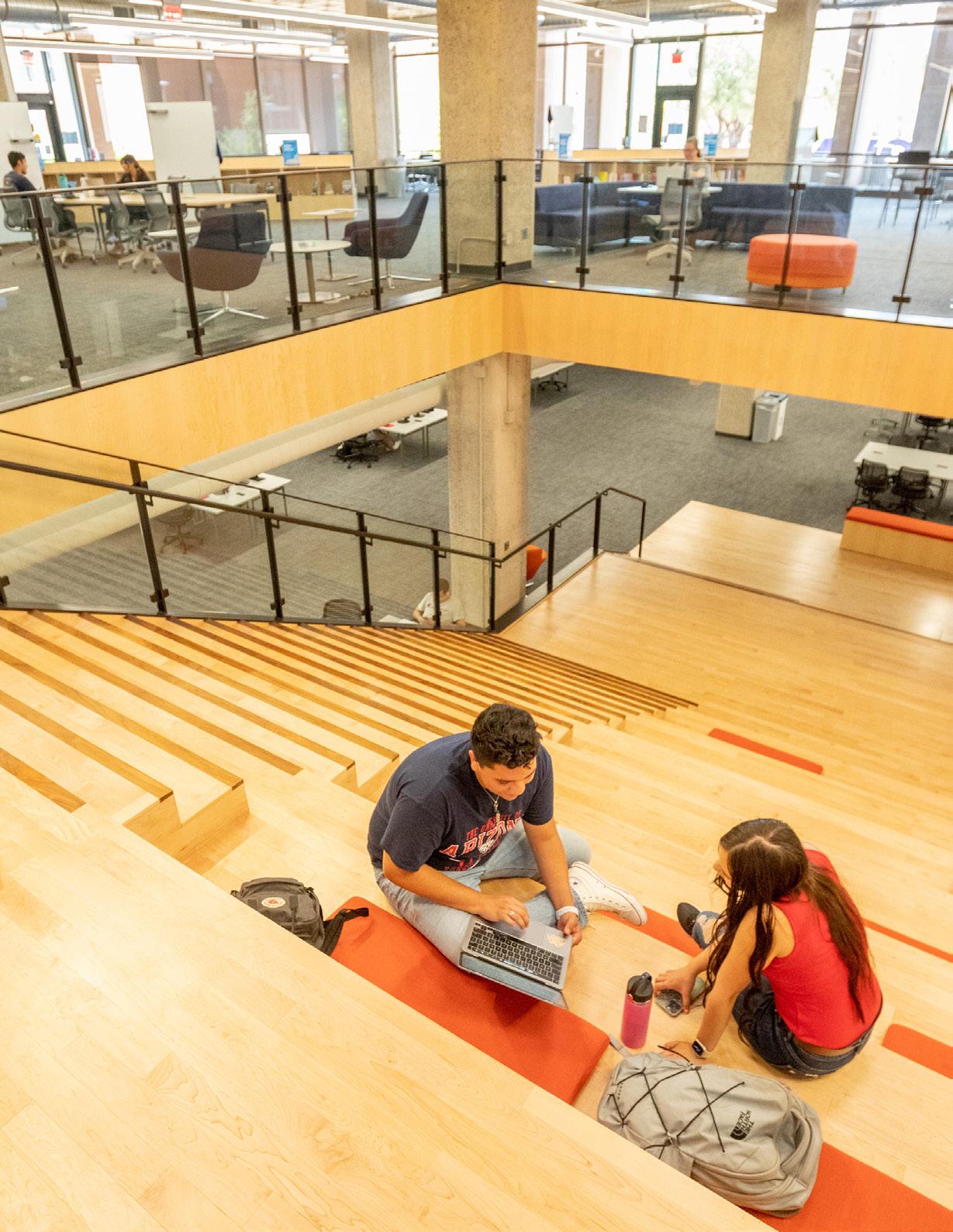

azmesa.arizona.edu
Mathematics, Engineering, Science Achievement is a nationwide, school-based outreach program designed to increase participation in Science, Technology, Engineering, and Mathematics (STEM) pathways and encourage college readiness for low-income or first-generation college-bound students in grades 6–12
Starting in California in 1970, MESA is one of the oldest STEM programs focused on increasing the number of students interested in pursuing STEM. Today MESA consists of 10 states with a shared mission of advocating for STEM education.
Arizona MESA serves middle and high schools across the state, including the Tucson and Phoenix metro areas as well as Nogales, Sells, Cottonwood, and the Tohono O’odham Nation. In addition, Arizona MESA partnered with its first community college at Phoenix College in 2021.
Through MESA, students learn about STEM opportunities, explore STEM subjects and fields, and receive academic assistance and support for college readiness.
Students and teachers can find a list of participating schools on Arizona MESA’s website.

cancercenter.arizona.edu/cancer-centers-training-and-education-summer-cactes-program
The Cancer Center Teacher Education Summer program provides training and educational support to high school science teachers in Arizona interested in incorporating cancer biology into yearly curriculum. Teachers attend a four-day seminar during the summer, in Tucson, to review modeling kits, learn about microarray analysis education regarding gene analysis and regulation, learn more about cancer in southern Arizona, and review the fundamentals of cancer terminology and pathology.
Teachers who have participated in CaCTES are eligible to participate in the MOTER program during the academic year. The CaCTES program is free to attend and teachers are given a stipend for participation. Teachers from outside the Tucson-metro area can be accommodated with travel and lodging expenses reimbursed.
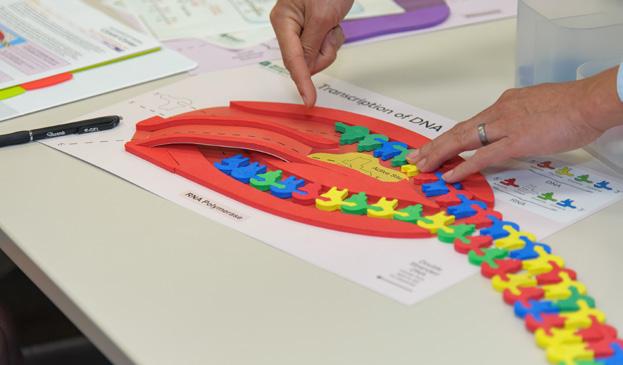

phoenixmed.arizona.edu/Instamed

InstaMed is a program at the U of A College of Medicine – Phoenix led by current medical students offering interactive, virtual mini-medical scenarios and activities for high school students in Arizona. This program is specially created for students that have an interest in medicine but are unable to attend in-person programming with Saturday Scrubs.
Sessions are available throughout the year and require pre-registration.

keys.arizona.edu

Hosted at the University of Arizona’s BIO5 Institute, the KEYS program supports high school students interested in developing STEM skills. High school interns gain experience working on immersive, real-world projects under the mentorship of University of Arizona scientists.
KEYS is a seven-week summer program with an introductory week reviewing a variety of bioscience and data science techniques as well as the foundations of science literacy then a six-week immersive laboratory experience. The program culminates in a presentation of lessons learned to friends, family, and the academic community.
Eligibility
Age: 16 years or older
Residency: Minimum 1 year of Arizona residency

healthsciences.arizona.edu/outreach/student-engagement-and-career-advancement/programs/med-start
The Med-Start Health Careers Program is a six-week summer academic enrichment program focused on improving access to information and resources for 11th grade high school students interested in the health professions. Students reside on the University of Arizona campus for the duration of the program.
Med-Start, in collaboration with the Arizona Area Health Education Centers (AZ-AHEC), introduces high school students to a future in the health professions by exploring career opportunities and providing college-level coursework in English, science, and math. Students gain experience through opportunities to participate in professional lectures, health-related field trips, and hands-on lab experiences, all while living on campus.
Eligibility
Education:
• Completed junior year of high school
• GPA of 3.0 or higher
Citizenship: U.S. citizenship or hold U.S. permanent resident status
Residency: Minimum 1 year of Arizona residency

cancercenter.arizona.edu/training-education/high-school-students-teachers/moter-program
The Mobile Oncology Training, Education, and Recruitment program is an outreach initiative to introduce cancer biology to high school students across southern Arizona. The MOTER program collaborates with high school science teachers by providing hands-on cancer biology activities that reinforce state bioscience standards.
Guided by their teacher, students work with hands-on modeling kits to learn about genetics in a colorful, fun, and engaging way. Students work in small groups to explore the impact of DNA and RNA mutations and protein synthesis.
The MOTER program has reached 19 high schools across Southern Arizona as well as U of A collaborations with UACC’s COE office, the Steps 2 STEM, and within the College of Medicine – Tucson.

An initiative of the Office of Early Academic Outreach at The University of Arizona, the Native American Science & Engineering Program is a free, yearlong program designed to provide Native American high school students with the necessary resources to enroll in college and pursue a career in a Science, Technology, Engineering, or Mathematics (STEM) field. NASEP participants will gain a wide exposure to these fields through interactions with university experts on many subjects, including environmental sustainability.
Students begin with a week long stay on the U of A campus during the summer where they participate in STEM workshops, a tour of Biosphere 2, and tours of various STEM colleges as well as lessons related to building a computer, computer coding, engineering projects, and lab research.
The program continues throughout the year where students work on research projects, gaining experience in working with the scientific method and create collegiate level research posters to present at local and regional science fairs. Throughout the fall and spring, students can participate in events across the state which have previously included the Navajo Nation Fair & Parade, the Tribal Environmental Health Forum, the American Indian Science & Engineering Society (AISES) regional conference, and the Southern Arizona Research, Science and Engineering Foundation (SARSEF) Fair.
Eligibility
Education:
• Rising high school junior and seniors
• Completing physics, chemistry, and pre-calculus with a “C” or better
Tribal Enrollment: Enrolled member or descendant of an American Indian/Alaskan Native or Native Hawaiian Tribe*
*If you are not an enrolled member of a Federal or State recognized tribe but are interested in participating, contact NASEP staff.


azskincancerinstitute.org/project-sass-students-are-sun-safe
Project Students Are Sun Safe is a health education program through the Skin Cancer Institute at UACC. University of Arizona students in the health professions are trained as peer educators teach Project SASS curriculum to middle and high school students in partnership with middle and high school teachers. The curriculum includes a lecture reviewing measures and practices that help prevent skin cancer along with hands-on, grade-appropriate activities. The lesson is designed to fit into a 55-minute class period.

phoenixmed.arizona.edu/saturdayscrubs

Saturday Scrubs is a free program at the U of A College of Medicine – Phoenix designed to encourage and inspire Arizona high school students to explore their existing interest in becoming a physician. Each monthly Saturday Scrubs event is intended to introduce participants to a variety of topics related to medicine and the human body. Every twohour session includes lectures by medical professionals and hands-on, interactive activities.
Sessions are available throughout the year and require pre-registration.
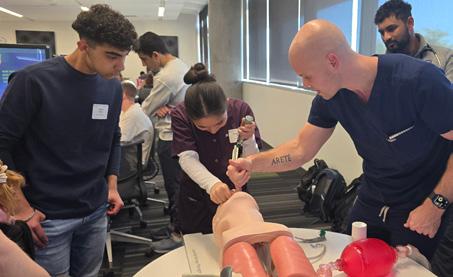
Interested in additional support as a pre-college student?
Check out the office of Early Academic Outreach at the University of Arizona for additional information on K-12 programs, scholarship information, testing preparation resources, and much more!

swehsc.pharmacy.arizona.edu/outreach/youth-activities/steps2stem_overview

The Steps 2 STEM (Science, Technology, Engineering, Mathematics) Summer Research Internship is a four-week research experience for high school students participating in JTED’s Biotechnology or Health Care Foundations programs
Students participating in Steps 2 STEM will complete two days of science literacy training and spend the remainder of the program working with professionals in STEM-related fields across the University of Arizona. At the conclusion of the four-week internship, students present their research findings at the annual Steps 2 STEM Research Exhibit.
During the program, students will expand their understanding of science literacy and public speaking, work in research laboratories across the U of A, receive certifications in Bloodborne Pathogens & Lab and Chemical Safety, and receive 3 units of transferable college credit for the PCOL 105A course.
Eligibility
Completion of MCB 101 (Biotechnology 1) and MCB 102 (Biotechnology 2) by the start of the program is preferred.
Age: 16 years or older by the beginning of the program
Education: Participating in Pima County’s JTED Biotechnology or Health Care Foundations programs
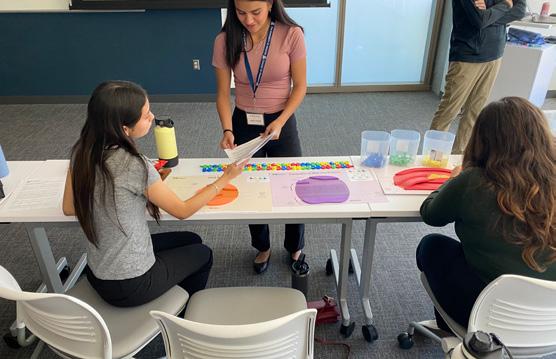

engr.arizona.edu/k12/k12_SEA

The Summer Engineering Academy offers summer outreach programming for rising ninth through twelfth graders, as well as graduated high school seniors who want to learn more about engineering. Students will work with University of Arizona professors, undergraduate students, and graduate students to support project design and participate in handson activities. Students learn more about what engineering degrees are available as well as what career opportunities are open to graduates while learning about current research at the U of A.
SEA offers both residential camp and day camp options. All participants are encouraged to apply for needs-based scholarships.

ignorance.medicine.arizona.edu/programs/summer-institute-medical-ignorance
The Summer Institute on Medical Ignorance is a high school student research program hosted by the University of Arizona College of Medicine – Tucson (COM-T). SIMI students work paid, full-time summer positions in basic and clinical research laboratories within COM-T. Participants are introduced to near-peer mentors who are current medical students and medical faculty mentors. Visiting professors conduct bi-weekly research seminars.
The program serves current high school sophomore, junior, and seniors. The program culminates in an oral presentation seminar regarding each students’ research.
Eligibility
Education: Cumulative GPA of 3.0 or better
Citizenship: U.S. citizenship, hold U.S. permanent resident status, or in the case of foreign nationals, hold a visa allowing them to work in the U.S. with a social security number

phoenixmed.arizona.edu/summerscrubs

Summer Scrubs is a summer health career exploration program at the U of A College of Medicine – Phoenix (COM-P) that helps high school students prepare for their future in the health professions. With this program, students will get the opportunity to participate in professional lectures, health-related field trips, and hands-on lab experiences.
Summer Scrubs offers two programs for different high school grade levels: the Explore Medicine Program for rising seniors and the Healthcare Team for rising sophomores and juniors. Please note that there is a cost associated with each program and scholarships are available.
The Explore Medicine Program is designed for students who are interested in becoming a physician. Participants explore several physician specialties by learning from medical doctors about their work. The program offers both a residential camp and a day camp.
The Healthcare Team is a day camp that allows students to learn more about different occupations in the healthcare field. Students will hear from medical doctors, physician assistants, nurses, pharmacists, physical therapists, occupational therapists, nurse practitioners, and respiratory therapists while also learning about nutrition and dental programs.
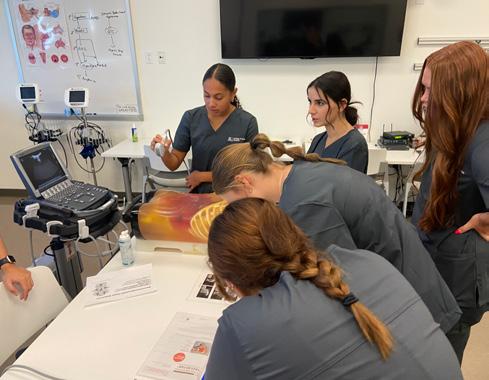
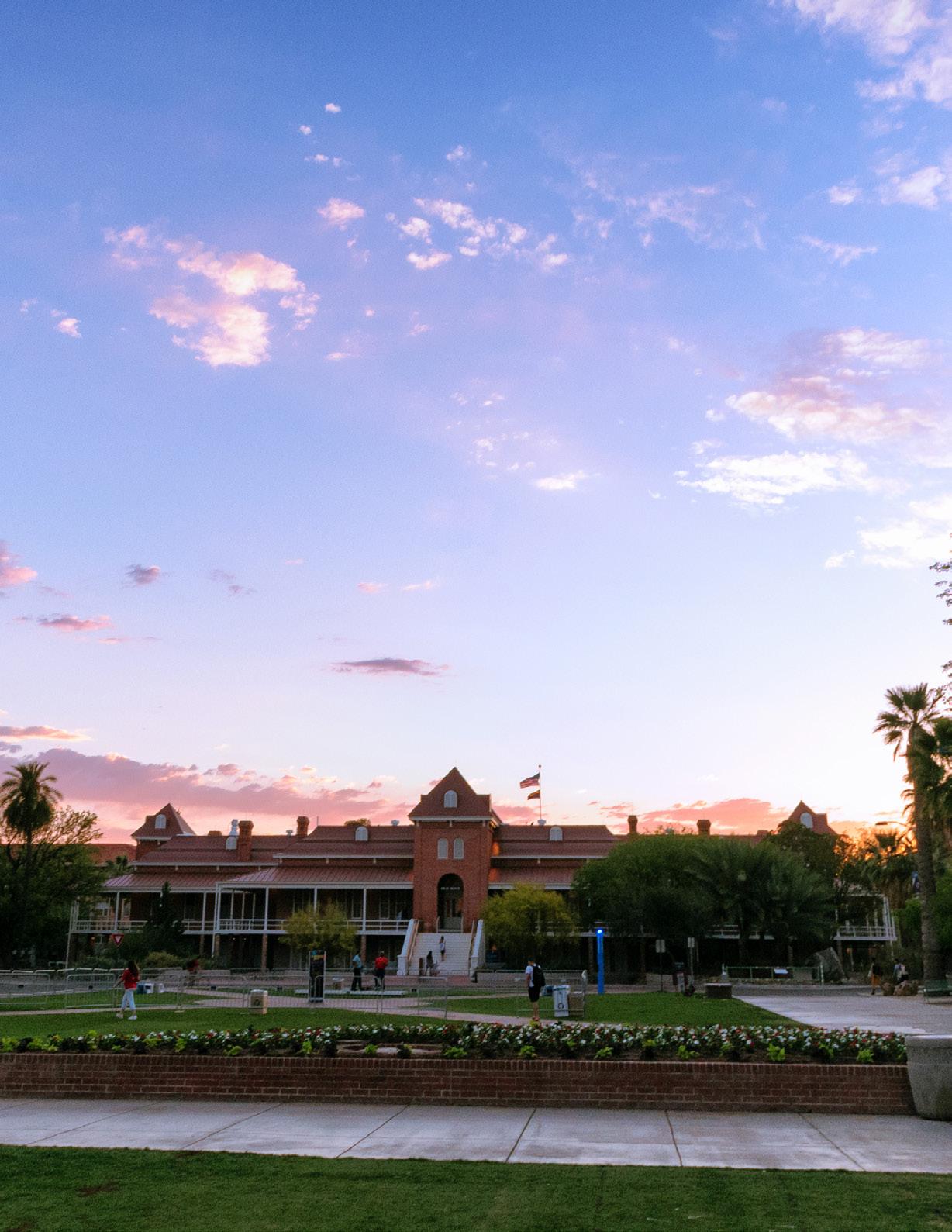

cancercenter.arizona.edu/training-education/post-baccalaureate-scholars
Funded by the American Cancer Society (ACS) Center for Innovation in Cancer Research Training, both the Undergraduate Summer Internship Program and the Post-baccalaureate Fellows Program aim to grow the cancer research workforce by providing training opportunities and support to students seeking careers in the science and health professions. Expanding training opportunities in science is critical because it invigorates problem-solving, drives innovation, and better equips the scientific community to more effectively address cancer prevention, treatment, and care.
The University of Arizona currently offers two programs: a 10-week Undergraduate Summer Internship Program and a two-year Post-baccalaureate Fellows Program.
The ACS internship supports undergraduate students in increasing their awareness of, and enthusiasm for, opportunities to work in cancer research. Interns spend 10 weeks during the summer engaging in hands-on research with one-on-one mentorship by accomplished investigators in a cancer lab or in a clinical or community setting. Participants receive a stipend for each week of participation in the program.
Eligibility
The Summer Undergraduate Internship Program targets students with an interest in STEM fields, particularly those from broad academic backgrounds.
Education:
• Full-time undergraduate student as a rising sophomore, junior, or senior
• Minimum cumulative GPA of 2.75 and in good academic standing
The ACS Post-baccalaureate Fellows Program focuses on individual and professional development of bachelorlevel trainees while offering financial and support services to prepare for a career in cancer research. The DICR Post-baccalaureate program is a paid, two-year program. Students are mentored by an accomplished investigator in a cancer research lab or in a clinical or community setting. Participants receive a stipend and funds to travel to professional meetings, cover application fees, and to offset healthcare coverage, childcare, and transportation.
Eligibility
The ACS Post-baccalaureate Fellows Program serves students who seek to increase their research experience and intend to pursue training in cancer research in a doctoral or MD/PhD program. Education:
• Bachelor’s degree
• Aspiring for a doctoral degree in a STEM discipline or health profession

healthsciences.arizona.edu/outreach/student-engagement-and-career-advancement/programs/
Arizona Health Opportunities Pathways to Excellence is a collaboration between academic and community partners with a goal of promoting and supporting the pipeline of allied health and health professionals in the state of Arizona. AZ-HOPE works with students who have an interest in strengthening their competitiveness and successful admission and completion of allied health and professional degrees.
Students and aspiring students to any Arizona allied health or health professions programs are eligible to apply. NonUniversity of Arizona students are encouraged to apply to eligible programs.
The AZ-HOPE Bridge Program is a five-week, full-time college transition program for students newly admitted to the U of A directly from high school, transferring from community college, or adult non-traditional learners (including Military veterans).
Students receive five college credits while completing three courses during the program. Throughout the program, students engage in professional readiness workshops designed to support students entering a new collegiate environment. Students receive a stipend for participating in the program.
AZ-HOPE also offers the Ambassadors Institute available for anyone on their collegiate journey, from undergraduates to early career faculty. See more information in the Programs for Undergraduates through Early Career Faculty section.

The Arizona Science, Engineering, and Mathematics Scholars programs provide a wide variety of supportive services to students with a declared STEM major at the University of Arizona. The program focuses on students who are the first in their family to attend college, from low-income households, and/or who transferred to the U of A from a community college.
ASEMS offers four programs to the undergraduate community at the U of A, including: a program for undergraduate research program, a program specifically designed for community college transfer students, a program exclusively for students within the College of Agriculture, Life, and Environmental Science, and a general support services program.
Arizona’s Science, Engineering, and Mathematics Scholars Scholar Training Academy for Research in STEM is a yearround undergraduate research and mentoring program for ASEMS students who have interest in pursuing a doctoral degree (PhD), master’s degree (MS, MA, MPH, etc.), or professional degree (MD, DVM, DO, etc.). Funded through a grant from the Gordon and Betty Moore Foundation, ASEMS STARS recruits students in the STEM fields, supports the development of skills necessary to excel in their academic studies, and provides assistance in gaining admission to an advanced degree program.
Participants work with a U of A faculty member on a small-scale research project in their field of study. Benefits include GRE preparation workshops, a summer research stipend, summer tuition for 6 units, and waived registration fees.
Eligibility
Education:
• Enrollment at the University of Arizona as a rising undergraduate junior or senior
• Minimum cumulative GPA of 3.0
• Interest in pursuing a graduate degree
The ASEMS Transfer program provides targeted services specifically for students who have transferred to the U of A from a community college. ASEMS-T is designed to assist students studying a science or engineering major in successfully obtaining a bachelor’s degree. To achieve this goal, the program offers support from the time students enter the program through graduation.
CALES ASEMS is aimed specifically at STEM majors in the College of Agriculture, Life, and Environmental Sciences, which includes the following cancer-relevant programs: Animal Sciences, Applied Biotechnology, Environmental Sciences, Microbiology, Nutritional Sciences, and Precision Nutrition and Wellness. Students follow a different timeline of services depending on whether they are entering as a first-year student or transferring from a community college.
Eligibility
• Eligible students must meet one of the following eligibility criteria:
• First generation college student
• Offered or awarded a Pell Grant
• Community college transfer student
TRiO Asems
TRiO programs provide student services to undergraduate students at the U of A who are pursuing majors in a STEM field and who are low-income, first-generation college students, and/or individuals with disabilities.
Eligibility
Eligible students must meet one of the following eligibility criteria:
• First generation college student
• Offered or awarded a Pell Grant
• Community college transfer student
Specifically for STEM majors in the College of Science, the College of Science First Years Program supports students in a wide variety of majors, including the following cancer-relevant programs: Chemistry and Biochemistry, Molecular and Cellular Biology, Neuroscience, and Psychology.
Eligibility
First generation college student
Offered or awarded a Pell Grant

healthsciences.arizona.edu/outreach/student-engagement-and-career-advancement/programs
The FRONTERA summer internship is a cutting-edge, 10-week research experience that provides an extraordinary laboratory training opportunity pairing junior and senior-level undergraduate scholars with preeminent University of Arizona health sciences researchers. This is a premier research experience for undergraduate students, arming them with skills to make them competitive and successful in pursuing post-secondary education and research.
Participants are matched with faculty mentors engaged in biomedical and public health research that impacts border communities, while engaging in service-learning activities and volunteering in local clinics. Concurrently, they develop an in-depth understanding of the pathway to medical school, including study and test-taking skills, preparations for the MCAT and GRE, and drafting a personal statement. In the final week, participants present the outcome of their research in the Undergraduate Research Opportunities Consortium (UROC) poster session.
Eligibility
Education:
• Enrolled at as a junior or senior level undergraduate student at any Arizona university
• Minimum completion of one-year general biology and general chemistry
• Minimum cumulative GPA of 3.0
• Pell Grant eligible
Citizenship: U.S. citizen or permanent resident status

grad.arizona.edu/gci/uroc/uroc-programs
The University of Arizona Graduate College offers an amazing summer research experience focused on health issues that disproportionately affect specific communities. The Minimizing Health Disparities program connects undergraduate students to a U of A faculty mentor in the biomedical field. Students work in mentor labs for 40 hours a week over the summer. In addition, MHD offers a weekly speaker series focused on biomedical research related to health disparities, 6-units of upper-division undergraduate coursework (with tuition and fees paid for by the Graduate College), workshops focused on issues related to biomedical research and graduate school preparation, coursework and workshops on organizing research, research ethics, public speaking and communication skills, creating and presenting an outstanding research poster, and crafting a successful graduate school application. The program culminates in an oral presentation and scientific poster presentation at the end of summer.
Eligibility
MHD is open to U of A and non-U of A students.
Education:
• Enrollment as an undergraduate as a rising junior or senior at an accredited four-year university or community college
• Declared major leading to a biomedical career path (i.e. Biology, Biochemistry, Molecular and Cellular Biology, Microbiology, Nutritional Sciences, etc.)
• Minimum cumulative GPA of 3.0

nsurp.org
The National Summer Undergraduate Research Project is a virtual research program that matches undergraduate students from across the U.S. to laboratory mentors around the world for a full-time, eight-week research experience over the summer. All NSURP programming (research, seminars, meetings, etc.) takes place remotely.
Undergraduate students in Microbiology, Immunology, Cancer Biology, and Biomedical Engineering are matched to lab mentors who can provide a remote summer research project experience. Students are paid a weekly stipend for the duration of the program. In addition, NSURP provides a science and professional development seminar series and a platform for participating students to present their research online in an official capacity.
Eligibility
Education: Undergraduate students with a declared major in Microbiology, Immunology, Cancer Biology, or Biomedical Engineering
Citizenship: U.S. citizenship or permanent resident status

cancercenter.arizona.edu/nacp-research-education-core
The Partnership for Native American Cancer Prevention is a collaboration between Northern Arizona University and the University of Arizona’s Cancer Center, funded through the National Cancer Institute (NCI). The mission of the NACP is to alleviate the unequal burden of cancer among Native Americans of the Southwest through research, training, and community outreach programs.
As part of NACP’s Research Education Program, undergraduates will learn more about health disparities among Native Americans, develop critical thinking, problem-solving, and information delivery skills, explore career pathways, learn to work in a team, and network with peers and mentors. Participants work 35 hours per week for 12 weeks during the summer.
The program is designed to facilitate the entry of Native Americans into biomedical research and healthcare professions while engaging communities in research and training relevant to their needs. Research projects include laboratory, field based, and community-based participatory research. NACP at UACC partners with the Undergraduate Biology Research Program on select activities to increase the student network, disseminate findings broadly, and engage in career exploration.
Eligibility
Education: Enrollment at the University of Arizona as an undergraduate student
Citizenship: U.S. citizenship or permanent resident status
For more information about NACP, please visit:
Northern Arizona University: in.nau.edu/nacp
UACC: cancercenter.arizona.edu/nacp-research-education-core

phoenixmed.arizona.edu/premed-summer

The Pre-Medical Summer School is a pathway program designed for undergraduate, post-baccalaureate, and graduate students. This three-month summer program prepares students to become competitive medical school applicants through workshops, seminars, panels, and hands-on experiences such as volunteering, shadowing, and educational clinics.
The program offers social support, as well as research and clinical opportunities, all guided by the college’s four pillars: Education, Research, Clinical, and Community. These pillars are integral to the holistic review of medical school applications.
Eligibility
Age: Over the age of 18
Education: Undergraduate, post-baccalaureate, or graduate student
Residence: Residing in the Phoenix-metro area for the duration of the program; students traveling to the Phoenix area are welcome and expected to independently arrange housing and transportation

phoenixmed.arizona.edu/premed-academy

The Pre-Medical Academy (PMA) is a pathway program designed for undergraduate, post-baccalaureate, and graduate students navigating the complexities of the medical school application process. PMA is a 10-month program running from August to May, offering an extensive time commitment similar to the PMSS program but spanning the entire academic year.
The program provides a comprehensive array of workshops, seminars, panels, educational clinics and offers handson experiences such as volunteering and shadowing. These activities help students build relationships with the U of A College of Medicine – Phoenix (COM-P) while fostering meaningful interactions with peers, faculty, and healthcare professionals.
PMA equips students with invaluable knowledge about the medical school application process, helping them make informed career decisions. Like PMSS, PMA is guided by the college’s four pillars — education, research, clinical, and community — which are central to the holistic review of medical school applications.
Eligibility
Age: Over the age of 18
Education: Undergraduate, post-baccalaureate, or graduate student
Residence: Residing in the Phoenix-metro area for the duration of the program; students traveling to the Phoenix area are welcome and expected to independently arrange housing and transportation
Interested in pursuing medical school?
Check out the Pathway Scholars Program, available to those with a bachelor's degree! See the Programs Graduate and Medical Students section.

azskincancerinstitute.org/project-sass-students-are-sun-safe
Project Students are Sun Safe is a health education program provided through the University of Arizona Skin Cancer Institute at UACC. U of A students in the health professions are trained as peer educators to teach skin cancer prevention messages to middle school and high school students. Ambassadors complete five educational modules on skin cancer biology, epidemiology, and health messaging. Once trained, students lead interactive sun safety curriculum and educational, hands-on activities to the southern Arizona community.

step-up.arizona.edu
The Student Transformative Experiences to Progress Undergraduate/Graduate Professionals for cancer prevention program is a multidisciplinary initiative led by Cancer Prevention and Control Program member faculty at UACC. It is uniquely designed to provide undergraduate and masters degree-seeking students with an intensive, 10-week summer research experience in cancer prevention and control.
Students complete a research immersion with a faculty mentor or STEP-UP community partner to develop skills in research methods and are provided education in content areas, such as: literature reviews, communicating research findings, community outreach and engagement, near-peer mentoring, collaboration, pathways to a career in CPC science, professional development, and funding for research and education.
Students gain experience in interacting with the community through various community outreach and engagement opportunities and are encouraged to practice personal cancer preventative behaviors throughout the program and beyond.
In addition, students gain a NIH Responsible Conduct of Research certification. STEP-UP students are paid for the duration of the program.
Eligibility
Education:
• Currently enrolled in an undergraduate or masters’-degree program:
- Undergraduate junior or senior
- First or second year masters’ during fall semester following summer program
• Minimum cumulative GPA of 2.75
Citizenship: U.S. citizen or permanent resident status
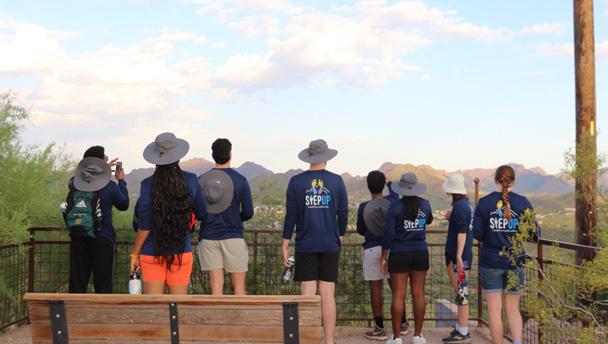

ignorance.medicine.arizona.edu/programs/summer-institute-medical-ignorance
The Summer Institute on Medical Ignorance-UG is an undergraduate research program hosted by the University of Arizona College of Medicine – Tucson (COM-T). SIMI-UG students work paid, full-time summer positions in basic and clinical research laboratories within COM-T. Participants are introduced to near-peer mentors who are current medical students and medical faculty mentors. Visiting professors conduct bi-weekly research seminars. The program culminates in an oral presentation seminar regarding each students’ research.
Eligibility
Education: Minimum cumulative GPA of 3.0
Citizenship: U.S. citizenship, hold U.S. permanent resident status, or in the case of foreign nationals, hold a visa allowing them to work in the U.S. with a social security number

ubrp.arizona.edu
The Undergraduate Biology Research Programs Office oversees eight programs supporting undergraduates who are pursuing a career in a STEM field, including the office’s namesake: the summer research UBRP apprenticeship.
UBRP supports students while they partner with researchers and resources across the U of A. UBRP students participate in mentored, self-directed work while learning how to conduct research, develop professional and communication skills, learn about a variety of biological research topics, and join a community of like-minded scholars.
The Beckman Scholars Program, funded by the Arnold and Mabel Beckman Foundation, helps stimulate, encourage, and support research activities by exceptionally talented, full-time undergraduate students who are pursuing their studies at accredited four-year colleges and universities in the United States. The Beckman Scholarship is a prestigious program, providing student stipend and additional funds for research supplies and travel support over the course of the 15-month experience. Two Beckman scholars will be selected annually.
The U of A Beckman Scholars Program gives undergraduates funding and support to conduct in-depth research with one of 14 U of A Beckman mentors on a full-time basis for two consecutive summers, and part-time during the intervening academic year. U of A Beckman scholars work on a project of interest in their selected mentor’s lab, engage in professional development activities such as leading undergraduates in small group discussions, inviting and hosting an eminent scientist to give a seminar at the U of A, meeting with Beckman mentors, and serving as student leaders within UBRP.
Eligibility
Education:
• Enrolled at the University of Arizona as a full-time undergraduate student as a freshman, sophomore, or junior at time of application
• Declared major in biological or chemical science, intending to pursue advanced science degree or career
• Be in good academic standing Research Experience: Minimum of six months of prior research experience
Citizenship: U.S. citizenship, permanent resident status, or DACA recipient
Programs for Undergraduate and Post-baccalaureate Students

ubrp.arizona.edu
The Biology Research Abroad: Vistas Open! program offers undergraduate students the opportunity to gain a global perspective on research. Students participate in a 10- to 12-week international research experience during the summer.
BRAVO! is designed to enhance scientific and professional skills while developing international collaborative relationships. Unlike traditional study abroad experiences where students take academic courses, BRAVO! participants have an independent and immersive experience, living as a visiting researcher and working in the host country.
Applications are thorough, including a research plan and international budget. Applications for BRAVO! are due the fall before the proposed summer of travel.
Eligibility
Education: Undergraduate enrolled at the University of Arizona
Research Experience: Minimum of six months of prior research experience
EHS-RISE is an introductory summer research program that aims to increase the representation of Native Americans in the STEM workforce while supporting students’ cultural identity. EHS-RISE offers undergraduates a full-time, paid, 12-week research experience on a project related to environmental health sciences (environmental factors that impact human health) and provides housing, professional development workshops, and spiritual and community activities. The content and structure of EHS-RISE has been designed to address the whole person, complementing the Native traditional belief that the body, mind, and spirit are interrelated.
Participants are placed into a lab with an EHS-RISE faculty mentor of interest where they will work for 35 hours per week for 12 weeks of summer. On-campus housing is provided at no cost to the student. To build skills beyond the lab, EHS-RISE incorporates weekly professional development workshops, scientific seminars, networking activities, spiritual and cultural events, and peer mentoring as well as optional educational field trips, social events, and community service activities.
Eligibility
EHS-RISE serves students who are Native American and Alaska Native.
Education:
• The RISE program is designed for freshman, sophomores, and first-year transfer students
• Enrollment at the University of Arizona with a declared major in a STEM field with interest in pursuing research experience in environmental health sciences
• Minimum GPA of 2.0
Citizenship: U.S. citizenship or permanent resident status
phire.arizona.edu
The Place-based Health Informatics Research Education program is a research training initiative for undergraduate students who are interested in biomedical research and looking to pursue graduate education in areas related to health informatics. PHIRE offers an intensive, paid research experience for 12-weeks during the summer, a part-time research experience during the fall semester and includes a tailored thematic minor in health sciences.
Eligibility
Education: Enrolled at or transferring to the University of Arizona as an undergraduate student, having completed two years of undergraduate education or having received an associate degree
The Undergraduate Biology Research Program is an educational program designed to teach students science by involving them in biologically related research. Undergraduate students are paid for their time in the lab, where they develop an understanding of the scientific method, receive a realistic view of biological research, and are mentored by faculty. Students are in the lab for 35 hours per week for 12 weeks of summer. They also acquire the tools necessary to be successful in post-graduate studies in biology, should they choose careers related to biology or research. Students begin UBRP with a full-time summer research apprenticeship and then have the option to continue in UBRP on a parttime basis during the academic year.
Eligibility
Education:
• Enrolled at the University of Arizona as an undergraduate with at least seven credit hours
• Be in good academic standing
• Have interest in biological research
Citizenship: U.S. citizenship, hold U.S. permanent resident status, or in the case of foreign nationals, hold a visa allowing them to work in the U.S.; students who do not fall into these categories are permitted to participate in UBRP on a voluntary, unpaid basis
American Society for Pharmacology and Experimental Therapeutics’ Summer Undergraduate Research Fellowship (ASPET SURF)
Each summer, five UBRP students are selected to receive an American Society for Pharmacology and Experimental Therapeutics’ Summer Undergraduate Research Fellowship as a part of the UBRP summer program. These students conduct research in the areas of pharmacology, drug discovery, and drug development with faculty mentors who are members of and partially funded by ASPET. ASPET SURF students participate in all UBRP activities, but additionally enjoy free student membership in ASPET for the current calendar year (which entitles them to apply for travel funds to present at ASPET meetings as well as other benefits) and a summer networking lunch to meet fellow ASPET students and mentors.
Interested students can apply for ASPET SURF by submitting an application to UBRP and marking the ASPET interest box. If selected for UBRP, students must then be accepted to work with an ASPET mentor for the summer to be considered for ASPET SURF.
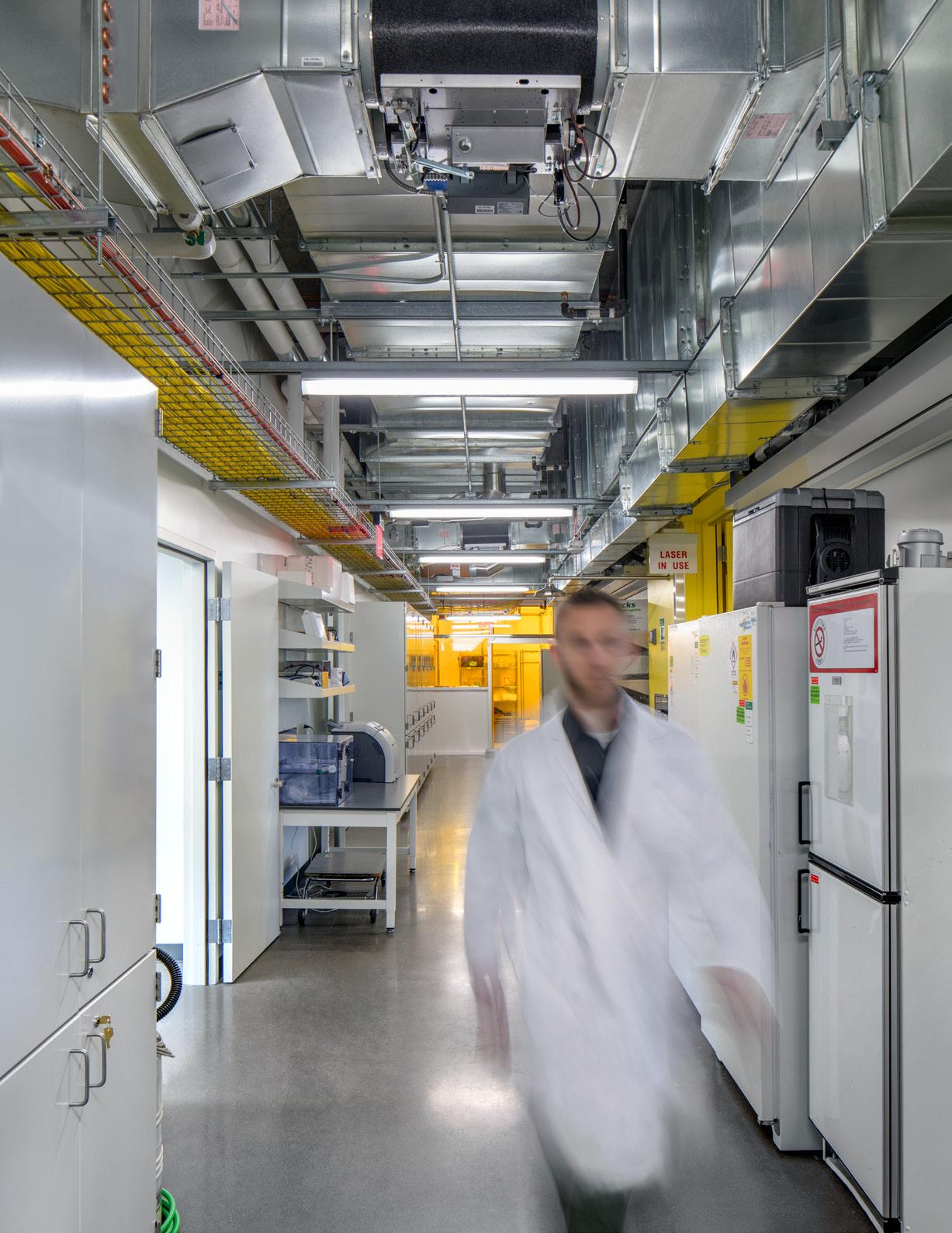
The PMA, PMSS, SASS Peer Educator, and STEP-UP programs are available for both undergraduate and graduate students! See the Programs for Undergraduate and Post-baccalaureate Students section for more information.

phoenixmed.arizona.edu/gto/travel-award
The College of Medicine – Phoenix (COM-P) Graduate Student Travel Award is designed to assist graduate students attending and presenting their research at scientific meetings. Applications for funding are accepted twice a year with deadlines announced by the Graduate Training Office. Awardees are selected based on the scientific merit of their abstract, a letter of recommendation from their Principal Investigator or advisor explaining the benefit of attending this conference, and the applicant’s statement of research and career goals.
Eligibility
Education:
• Enrolled as a graduate student at the University of Arizona
• Working with a PI at the College of Medicine – Phoenix

cancercenter.arizona.edu/training-education/graduate-students
CRTEC PROGRAM
The F-Award Readiness program works with graduate students and those at the postdoctoral level at the University of Arizona applying for NIH Fellowship (F) Awards with a cancer-related focus. Housed in UACC’s CRTEC office, the FAR Program prioritizes students who are mentored by UACC member researchers.
Participants receive one-on-one support through the grant writing and application process and commit to a six-to-ninemonth process of grant writing and revisions. The program introduces grantsmanship, hosts monthly training sessions, and offers students the opportunity to work one-on-one with a grant writer.
To learn more about the FAR Program and inquire about availability, please reach out to the CRTEC team at uacc-crtec@arizona.edu
Eligibility
Enrollment at the University of Arizona at the graduate level or a postdoctoral fellow or researcher. Mentorship under a University of Arizona Cancer Center member or interest in pursuing cancer research.

msrp.medicine.arizona.edu
Sponsored by the U of A College of Medicine - Tucson, the long-standing Medical Student Research Program allows student research fellows to gain familiarity with biologic horizons in both basic and clinical science, acquire a broad grasp of research skills, learn to communicate ideas, refine clinical problem identification and solving. In addition, students are given the opportunity to meet distinguished visiting physicians and scientists, and work closely with faculty and other students at various levels of their careers.
Medical students can be awarded either NIH short-term (during vacation periods) or extended full-time research fellowships (for one or more years).
See the program website for more information on eligibility and application information.

PROGRAM
society.asco.org/news-initiatives/current-initiatives/cancer-care-initiatives/oncology-summer-internship
Sponsored by the American Society of Clinical Oncology (ASCO), the Oncology Summer Internship introduces rising second-year medical students to the field of oncology.
During the six-week summer internship, students actively observe oncology professionals as they deliver care and make clinical decisions in oncology clinics, hospitals, research labs, and other settings. Students observe a variety of oncology specialties during their internship and can expect to shadow oncologists that specialize in medicine, radiation, and surgery, as well as pathologists. During the internship, students participate in tumor boards, multidisciplinary case forums, networking events, and professional development workshops.
OSI is hosted at a variety of sites across the nation. UACC has hosted OSI in partnership with the College of Medicine –Tucson since 2021, placing students with researchers in fields they are interested in pursuing. Medical students should plan to apply for OSI through ASCO’s application portal between October – January of their first year of medical school.
Eligibility
Education: Completed one year of medical school

winnawards.org/winn-cipp
The Robert A. Winn Clinical Investigator Pathway Program provides medical students a six-week summer service-learning externship in community-based clinical research sites where they benefit from exposure to clinical research, community engagement experiences, and leadership development. The CIPP is a program of the Robert A. Winn Excellence in Clinical Trials Award Program, which focuses on increasing opportunity in clinical trials to transform the clinical research space.
Winn CIPP externs will be matched up with a mentor who is a clinic-based UACC member, a Winn CDA scholar, and an early-stage investigator.
Eligibility
Education: Enrolled in an MD, MD/PhD, DO, or DO/PhD program at an accredited U.S. medical school as a first, second, or third year student Citizenship: U.S. citizenship, hold U.S. permanent resident status, or DACA recipient

cancerscholars.arizona.edu
The Integrative Cancer Scholars is an innovative and highly competitive T32 predoctoral training program that has been supported by the NCI for 45 years. The ICS program is anchored by its laboratory and clinical co-mentorship structure and provides innovative translational cancer research-focused career development training for outstanding PhD and MD/PhD students that is distinct from what any other graduate programs at the University of Arizona offer. The generous support from the NCI and UACC empowers our Integrative Cancer Scholars to build critical achievements that establish them as emerging leaders in translational cancer research on a national and international level.
The ICS program provides full funding to students for two years and prepares participants for applying for future funding.
Eligibility
Education: Enrollment at the University of Arizona in a PhD or MD/PhD program pursuing cancer-focused research Citizenship: U.S. citizenship or permanent resident status

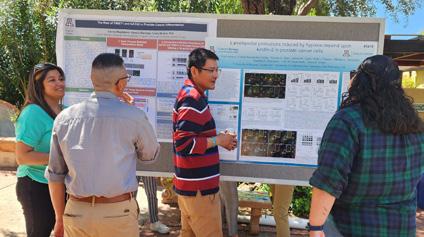

abbs.arizona.edu
The Arizona Biological and Biomedical Sciences Program integrates recruiting and admissions for the following graduate PhD programs in biological and biomedical sciences: Animal and Comparative Biomedical Sciences, Biochemistry and Molecular and Cellular Biology, Cancer Biology, Drug Discovery and Development, Genetics, Medical Pharmacology, Molecular Medicine, Pharmaceutics and Pharmacokinetics, Pharmacology and Toxicology, Physiological Sciences, and Plant Sciences.
Students accepted into ABBS are fully funded by a graduate assistantship, which includes payment of a stipend, tuition, registration fees, and health insurance. Students are only financially responsible for their fees. Students are admitted to the ABBS program with no formal commitment to a particular PhD program. Students take two instructional courses, one journal club, and one seminar course each semester, and they perform three laboratory rotations with faculty in any of the participating graduate programs. This provides maximum flexibility for students to shape their own curriculum within the available fields of study. Students can focus immediately on a particular research area and program, or they can explore various options. At the end of the third rotation, students join a lab and matriculate into one of the 11 participating graduate programs.
The ABBS program hosts a cohort of 25 – 30 peers to provide a strong network for students beginning graduate school. Students in the program meet weekly to practice scientific presentation skills and learn about various professional development topics.

cancerbiology.arizona.edu
The Cancer Biology Graduate Interdisciplinary Program (GIDP) at the University of Arizona in Tucson is a doctoral degree-granting program that emphasizes a translational research approach to address significant problems relating to cancer development and treatment. The program offers coursework and research opportunities leading to the PhD or MD/PhD degree in cancer biology and trains postdocs preparing for careers in academia and industry.
The program prepares its trainees for careers in cancer research through an interdisciplinary approach that involves faculty from a wide range of disciplines at the U of A. A major goal of the CBIO program is to provide trainees with an exciting and stimulating academic environment that inspires innovative cancer research, provides a foundation of knowledge in the scientific disciplines related to cancer research, and gives exposure to the challenges faced by clinicians who treat cancer patients. Program activities encourage the development of students’ critical thinking skills and provide them with the professional skills necessary for them to develop into successful and impactful cancer researchers.
CBIO students are recruited through the ABBS program within the U of A Graduate College.

phoenixmed.arizona.edu/pathway

The Pathways Scholars Program at the University of Arizona’s College of Medicine – Phoenix aims to provide a holistic foundation to Arizona pre-med students to succeed for the duration medical school. The program provides academic support, leadership development, and a dedicated community for students who are historically underrepresented in medicine who have graduated from college with an undergraduate degree. Through the Pathway Scholars Program, students earn a Master of Medical Studies (MMS) degree and guaranteed admission to the College of Medicine –Phoenix.
The Pathways Scholars Program aims to improve the physician workforce with the understanding that patient needs are best met when providers respect the wealth of values throughout our community and can relate to patients’ individuality. The program is designed for students who have experienced unique or greater-than-average challenges in preparing to become competitive medical school applicants.
Eligibility
Education:
• Bachelor’s degree completed at an educational institution in the U.S. or Canada
• Grade point average of 3.0 or better
Testing: Taken the MCAT exam within three years of intended matriculation into medical school and a minimum composite score of 495
Citizenship: U.S. citizenship or permanent resident visa status
Residency: Resident of Arizona


msrp.medicine.arizona.edu/guidelines-and-rationale-enrollment-course-requirements-evaluation
Hosted by the Medical Student Research Program, the Research Distinction Track is an academic credit-based research elective for medical students to earn six academic credits while undertaking extracurricular research. The program promotes research as a part of continuing medical education. Students must identify a mentor, submit an extensive research proposal, conduct a minimum amount of extracurricular research hours, present/attend MRSA, Datablitz and/or seminar sessions, and share their research in a culminating paper and oral presentation.
Eligibility
Education: Current University of Arizona medical student
The following list of graduate studies programs are disciplines pursued by students and researchers involved at UACC. While not a comprehensive list of all degree programs that can lend themselves to cancer research, the variety listed below demonstrates the vast array of subjects that are involved.
Cancer research involves a multidisciplinary team that requires not only basic science researchers but biostatisticians, clinicians, lab managers, clinical trial associates, community engagement specialists, counselors, psychologists, public health researchers and officials, and so much more.
College of Agriculture, Life, & Environmental Sciences
Animal and Comparative Biomedical Sciences
Environmental Science
Nutritional Sciences and Wellness
College of Engineering
Electrical and Computer Engineering
Biomedical Engineering
College of Information Science
Data Sciences
College of Medicine
Anesthesiology
Basic Medical Sciences
Cellular and Molecular Medicine
Clinical Research
Clinical Translational Sciences
Family and Community Medicine
Immunobiology
Internal Medicine
Medical Imaging
Medical Pharmacology
Medical Studies
Medicine
Neurology
Obstetrics and Gynecology
Otolaryngology
Pathology
Pediatrics
Physiology
Psychiatry
Radiation Oncology
Surgery
Translational Neuroscience
Urology
College of Nursing
Nursing
College of Pharmacy
Drug Discovery and Development
Molecular and Biochemical Pharmacology
Pharmacology and Toxicology
Pharmacy, Practice, and Science
College of Science
Bioinformatics
Chemistry and Biochemistry*
Molecular & Cellular Biology
Neuroscience
Psychology
*In partnership with the College of Medicine
College of Optical Science
Optical Science
Graduate Interdisciplinary Programs
Cancer Biology
Genetics
Neuroscience
Physiological Sciences
School of Health Professions and Global Medicine
Biostatistics
Clinical Translational Sciences
Community and Environmental Policy
Environmental Health Sciences
Epidemiology
Genetic Counseling
Health Behavior Health Promotion
Health Promotion Sciences
Public Health Practice and Translational Research
Public Health Policy and Management
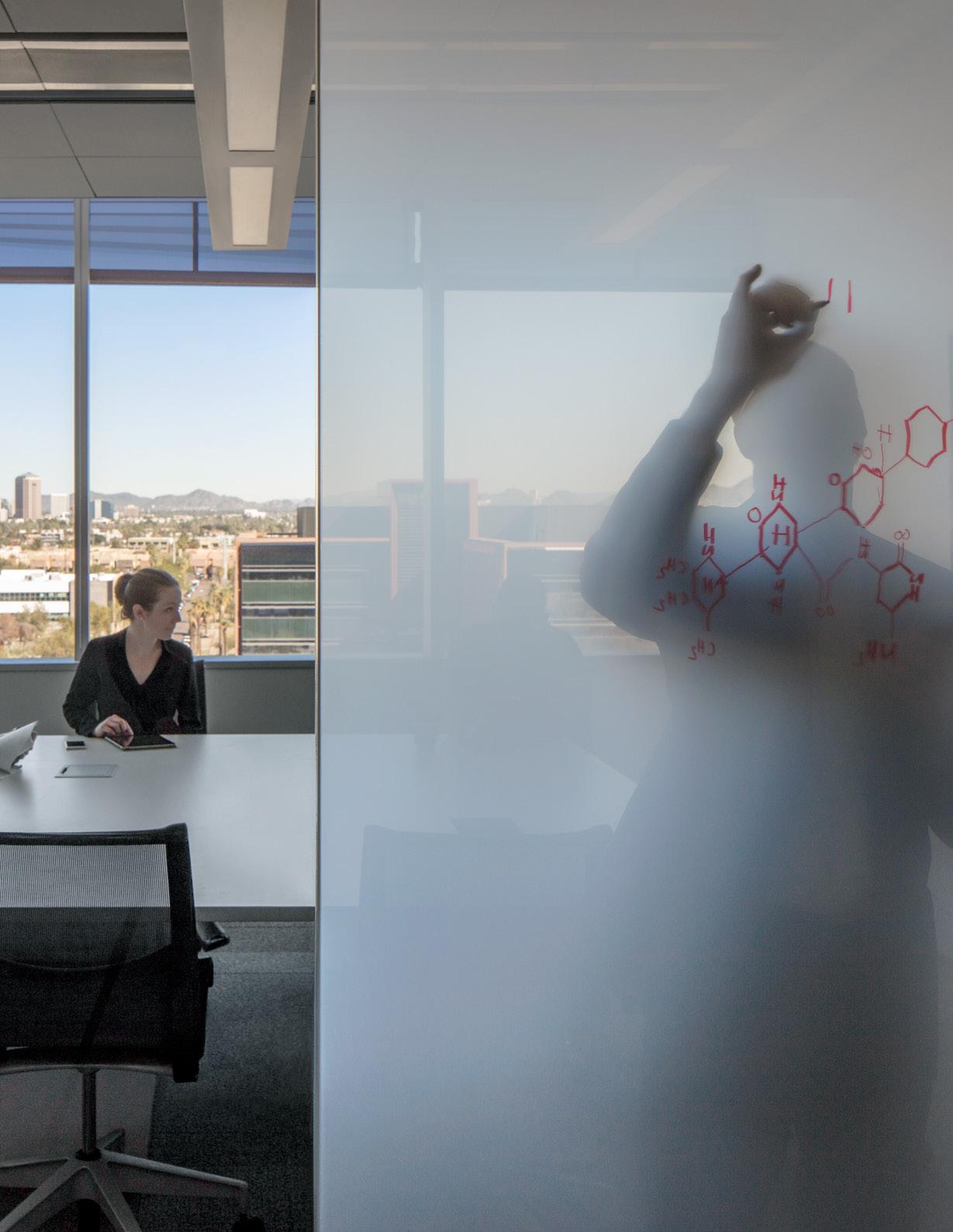

PROGRAM
cancercenter.arizona.edu/training-education/faculty-physicians
Funded by the American Cancer Society (ACS), the Institutional Review Grant (IRG) program supports University of Arizona researchers who are early-stage investigators as they pursue areas of cancer research including basic, clinical, population sciences, imaging, and bioengineering.
The IRG program offers funding to U of A faculty on a yearly basis. Those interested in applying should look for funding announcements on Arizona Cultivate.
UACC PROGRAM

cancercenter.arizona.edu/research/funding-opportunities/internal-funding-opportunities
The Clinical Scientist Award is available to UACC members and provides intensive mentored support in patientoriented cancer research to clinical faculty, including those with an MD, MD/PhD, or DO, who are in the first four years of their appointment as an assistant professor. Career development includes didactic training as well as participation in relevant UACC symposia, retreats, workshops, and grand rounds. The award culminates in the preparation for an impactful investigator-initiated trial (IIT).
A mentor must be aligned with the project application and supervise proposed research and career development of the applicant. Applicants may have more than one mentor and co-mentors are encouraged.
This award funds up to 0.25 cFTE per scholar for up to two years. Awards are reviewed annually for progress. Those interested in applying should look for funding announcements on Arizona Cultivate or check the link above for updates.
PROGRAM

cancercenter.arizona.edu/nacp-guides
The GUIDeS Shared Resource, within the Partnership for Native American Cancer Prevention (NACP), aims to support early stage investigators (ESI) and junior investigators (JI) with a range of career enhancement opportunities ultimately leading to the development of competitive research projects focused on cancer research, notably research addressing cancer disparities among Native Americans. To do this, GUIDeS pairs ESIs and JIs with a senior NACP research mentor and other inter-institutional collaborators to assist in the development of research projects and resulting grants and publications. GUIDeS supports investigators in navigating university regulatory, financial, and institutional requirements for conducting and submitting research while providing biostatistics and bioinformatics support services and expertise in Native American-based community engagement.
For more information about NACP, please visit: Northern Arizona University: in.nau.edu/nacp UACC: cancercenter.arizona.edu/collaborative-research/nacp

cancercenter.arizona.edu/research/funding-opportunities/internal-funding-opportunities
The K-Award Readiness Program works with postdoctoral researchers, clinical fellows, and as well as early-stage faculty conducting cancer research at the University of Arizona applying for NIH Career Development (K) Awards with a cancer-related focus. Housed in UACC’s CRTEC office, the KAR Program has a goal of creating a culture of support, leading to an increased number of K grant awardees at the U of A.
Participants receive one-on-one support with application development and coordinates with U of A Research Administration and the Pitch Your Grant series.
To learn more about the KAR Program and inquire about availability, please reach out to the CRTEC team at uacc-crtec@arizona.edu
The F-Award Readiness Program works with postdoctoral researchers and fellows as well as early-career researchers, in addition to graduate students.
See the Programs for Graduate and Medical Student section for more information.

cancercenter.arizona.edu/training-education/postdocs-fellows/cancer-prevention-and-controlpostdoctoral-fellowship-program
The T32 Postdoctoral Fellowship in Cancer Health Disparities provides rigorous preparation for those interested in becoming an independent cancer researcher. This NCI-funded T32 offers a multidisciplinary mentored environment to increase our understanding of the dynamics of cancer prevention, related health inequities, and increasing quality of life for survivors. The program includes an important focus on cancer health disparities in medically underserved populations.
The postdoctoral fellowship training program includes development of clear scientific and academic goals, constructive scientific guidance from top-level mentors, and support for presentation and publication of results. Each fellow will have a mentoring team and mentoring plan in place to ensure future success in academic research. The trainee will work with established investigators and is expected to engage in a research project, develop research proposal for external funding, produce two to three publications per year, and work with a multidisciplinary team.
Eligibility
Education: A postdoctoral degree in related field
Focus: Previous record or stated interest in cancer health disparities
Citizenship: U.S. citizen or permanent resident status

postdoc.arizona.edu
The Office of Postdoctoral Affairs is a resource available to all University of Arizona Postdoctoral Scholars. The office supports postdocs by providing career and professional development resources, fostering an inclusive academic community, and promoting excellence in research, innovation, and impact while supporting faculty in their role as postdoctoral mentors. We offer new postdoctoral scholars assistance with arrival and transition to life at the University of Arizona, host professional development workshops, offer intramural grants for new projects development or new skills training, and share information and highlight successes in a weekly newsletter and social media platforms.

uapostdocs.weebly.com
The University of Arizona Postdoctoral Association is run by postdoctoral scholars, for postdoctoral scholars. The mission of the UAPA is to enhance the postdoctoral experience at the University of Arizona and to support long-term success of its members. UAPA focuses on connecting people, developing potential, and supporting careers at both the University of Arizona in Tucson and the University of Arizona College of Medicine — Phoenix. All postdocs at the University of Arizona are automatically non-due paying members and can opt in to communications and get involved in events or join any committee that may be of interest at any time.
In addition to regular communications, the UAPA maintains a calendar of events, supports writing accountability groups, hosts regular webinars for international postdocs, and shares a postdoc handbook outlining information regarding getting oriented and settled on campus to fun social activities in Tucson.

deptmedicine.arizona.edu/education/residency-programs/advanced-dermatology-residency-program
The Advanced Dermatology Residency Program at the College of Medicine – Tucson is a three-year ACGMEaccredited program that leads to eligibility for certification by the American Board of Dermatology.
There are nine residents in total, and they complete their training at several sites in the community, including: Pima Canyon Dermatology Clinic, Southern Arizona VA Healthcare System, University of Arizona Cancer Center - North Campus, and Phoenix Children’s Pediatric Dermatology Clinic.
Residents gain experience in the following areas of dermatology: clinical, inpatient, pediatric, dermatologic surgery, Mohs micrographic surgery, cosmetic/aesthetic, dermatopathology, research, laser surgery, and phototherapy. Residents are actively involved in biweekly didactics sessions and weekly grand rounds, which complement their clinical learning.

rad-onc.arizona.edu/education/medical-residency
The General Surgery Residency program at the College of Medicine – Tucson is a five year residency program. Throughout the program, residents work with the departments seven divisions: General Surgery; Trauma, Surgical Critical Care, Burns, and Acute Care Surgery; Cardiothoracic Surgery; Surgical Oncology; Abdominal Transplantation; Vascular and Endovascular Surgery; and Pediatric Surgery.
Residents gain broad clinical experience, comprehensive education in surgical sciences, and excellent opportunities for achieving competence in basic and clinical investigation. The General Surgery Residency program works with three Tucson hospitals: Banner – University Medical Center (BUMC); Banner – University Medical Center South Campus; the Southern Arizona VA Health Care System (SAVAHCS); and Tucson Medical Center (TMC). In addition, residents regularly travel to other community facilities to expand their surgical experience. By working with a broad number of facilities, residents gain a large patient base that exceeds other programs in the U.S.

phoenixmed.arizona.edu/hematology-oncology-fellowship
The goal of the College of Medicine – Phoenix Hematology and Oncology Fellowship Program is to train and develop a new generation of hematologists and oncologists to provide comprehensive, compassionate and holistic care to patients with cancer and blood disorders, while caring well for themselves as well. Fellows will benefit from clinical and research training in a nationally recognized tertiary cancer center in the Phoenix metropolitan area. The programs' goal is to train physicians to lead continued growth in the field, whether through scientific contributions, clinical care, health policy, advocacy, leadership, or medical education.
The COM-P HemOnc fellowship program is a 36-month ACGME accredited training program based on ABIM standards for the training of physicians in the specialties of hematology and oncology. The program provides advanced training in the diagnosis and management of classic hematological diseases, malignancy hematology, solid tumors, stem cell transplant, CAR-T cell therapy, and palliative care.

Advanced Dermatology Residency Cohort

cancercenter.arizona.edu/outreach-and-education/training-education/postdocs-fellows/hematology-andmedical-oncology
Through the College of Medicine – Tucson Hematology and Oncology Fellowship, fellows become proficient medical care providers to those affected with blood disorders and malignant conditions, and exercise these skills in cancer prevention and control, early detection of malignancy, therapy of early and advanced blood disorders and malignancy, and the care of terminally ill patients.
Fellows learn to advocate for their patients within the health care system and to support patients and their families with compassion. Fellows gain expertise in a vast number of relevant procedures, medical literature and resources, the education of other physicians and staff, and the training of lower level trainees as well as residents, medical students, and fellows. In addition, fellows are trained on clinical and basic research clinical trials and gain experience in critiquing designs and interpretations of HemOnc trials while gaining experience in clinical or laboratory research methods and programs.
This fellowship training program works with the University Medical Center system, the Southern VA Health Care Center, the University of Arizona Cancer Center research labs, and the University Medical Center North/Arizona Cancer Center clinic facility. Throughout the program, fellows participate in rotations in inpatient HemOnc services, the in-patient Bone Marrow Transplant Service, in-patient consult services, and outpatient referral services in the various subspecialties associated with hematology and medical oncology.
In addition to standard and elective rotations, fellows participate in relevant conferences, a journal club with an attending physician, board review sessions, and weekly core lectures.
Integrative Medicine in Hematology Oncology (IMHO) Fellowship Program
cancercenter.arizona.edu/integrative-medicine-hematology-oncology-fellowship-program
The Integrative Medicine in Hematology Oncology Fellowship Program is the first of its type in the nation, founded in July 2022 as a collaborative fellowship with Mayo Clinic Arizona. Enrolled fellows follow the general curriculum for Hematology and Oncology Fellowship Training Program concurrently with the IMHO curriculum. The fellowship program will prepare the fellows to be board eligible for the Integrative Medicine Boards, should they decide to take them.

deptmedicine.arizona.edu/divisions/dermatology/education/micrographic-surgery-and-dermatologiconcology-fellowship
Throughout the one-year Micrographic Surgery and Dermatologic Oncology Fellowship at the College of Medicine – Tucson, fellows gain skills in independently performing Mohs and reconstructive surgery. Fellows are expected to begin the program with competency in basic cutaneous surgical techniques. Training takes place at the University of Arizona Cancer Center, the Southern VA Health Care System, and Oasis Dermatology.
Fellows work under the supervision of the program director, Jason DuPont, MD, while working in tandem on a daily basis. Fellows also spend time with two additional Mohs surgeons in the program, Jeff Krase, MD, PharmD, and Duane Whitaker, MD. Fellows gain experience in conducting patient interviews and physical examinations in addition to performing other cutaneous surgical procedures such as excisions, electrodesiccation, dermabrasion, chemical peels, and lasers.

medicalimaging.medicine.arizona.edu/education/fellowships/nuclear-radiology-fellowship
The Nuclear Radiology Fellowship at the College of Medicine – Tucson is a one-year graduate medical education program. Over the course of the fellowship, fellows receive training in: PET/CT for oncology, neurology, and cardiology; general nuclear medicine; nuclear cardiology; therapies including radium-233 for prostate cancer, y-90 radioembolization, and thyroid therapies. For the duration of the program, fellows have one academic day per week to pursue educational and research goals. This fellowship works closely with the University of Arizona Cancer Center.
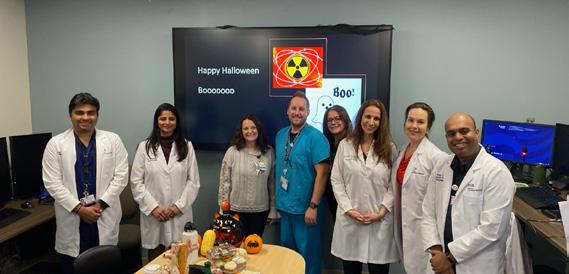

obgyn.arizona.edu/education/residency-program
This four year residency program in obstetrics and gynecology at the College of Medicine – Tucson works within a department with five active divisions including General Obstetrics and Gynecology, Reproductive Endocrinology and Infertility, Gynecologic Oncology, Urogynecology and Reconstructive Pelvic Surgery, and Maternal Fetal Medicine. The broad curriculum of the residency program encourages professional development in clinical, surgical, and research skills.
Learning experiences in gynecologic malignancies and pathology take place in residents' first, second, and fourth years. A second-year resident is assigned to pathology, attending weekly pathology conferences to review colposcopy, LEEP, and oncology cases are reviewed. Rotations in the University Gynecologic Oncology Services are thorough and include understanding staging systems, biopsies and surgical procedures, pelvic anatomy, epidemiology, and the principles of chemotherapy and radiation therapy, including the placement of intracavitary brachytherapy.
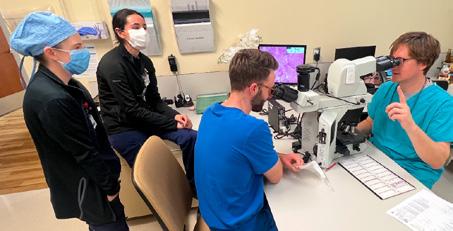

rad-onc.arizona.edu/education/medical-residency
The Radiation Oncology Residency at the College of Medicine – Tucson is a 48-month residency, with 36-months of clinical core curriculum of radiation oncology. Residents participate in multi-specialty tumor boards on a weekly basis, rotate through a month of dosimetry/physics, and a six-month block of research in clinical, biological, or physics/ engineering investigation. In addition, residents gain experience in teaching conferences and dosimetry rounds and participate in peer teaching throughout the program.
The RadOnc department consists of seven full-time physicians, four medical physicists, five dosimetrists, and six residents.
medicine.arizona.edu/education/residencies-fellowships
The following residency and fellowship programs at the College of Medicine – Tucson have interactions or rotations with oncology but do not significantly focus on oncology-related education.
Residencies
Anesthesiology: rotation at University of Arizona Cancer Center – North Clinic
Internal Medicine: rotation at University of Arizona Cancer Center – North Clinic
Neurology: elective rotation in oncology
Orthopedic Surgery: oncology rotation at Phoenix Children's Hospital and HonorHealth Scottsdale
Pediatrics: four-week rotation in pediatric heme onc
Urology: department has robust clinical skills in urologic oncology
Vascular Surgery: rotation in oncology surgery
Fellowships
Complex Spine Neurosurgery Fellowship: rotation in spinal oncology surgery
Critical Care Medical Fellowship: elective rotation in oncology
Endocrinology, Diabetes, and Metabolism: rotation at University of Arizona Cancer Center – North Clinic
Gasteroenterology: weekly biliary-pancreatic cancer multidisciplinary conference
Hematopathology: supports hematology onc by participating in bone marrow transplants and actively participates with Southwest Oncology Group
Hospice and Palliative Medicine: gain experience in pain in cancer patients and have a rotation at University of Arizona Cancer Center – North Clinic
Neuroradiology: collaborations with neuro-oncology tumor board
Pain Medicine: gain skills in treating cancer pain
Pulmonary and Critical Care: lung cancer clinic rotation at University of Arizona Cancer Center – North Clinic
Gastrointestinal Pathology: interactions with radiation oncology
Surgical Critical Care: may serve cancer patients during duration of program
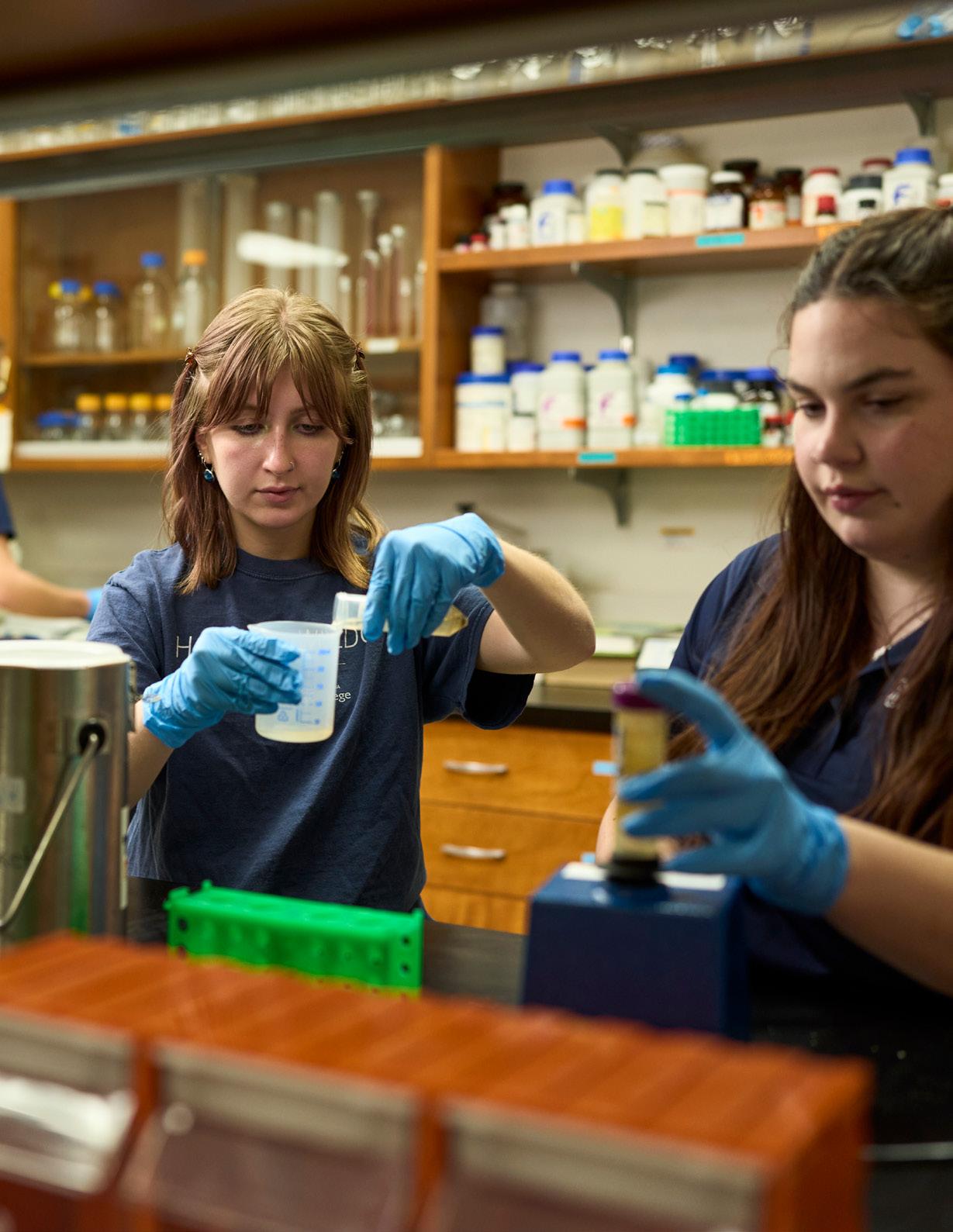

healthsciences.arizona.edu/outreach/student-engagement-and-career-advancement/programs/
The AZ-HOPE Ambassadors Institute is an innovative, multi-year academic development program for students at various stages along the continuum of development in the Allied Health Professions/Health Professions pipeline. This competitive multi-year program provides learning support services, mentoring, counseling, academic advising, scholarships, and stipends to individuals selected for participation.
The AZ-HOPE Ambassadors program is open to community college students, undergraduate students, and graduate or professional students at any institution.

Career mentoring is pivotal in both students and early career professionals achieving and identifying career goals. A mentor can help outline career pathways while providing guidance, support, and advice on how to navigate the university’s support systems to achieve growth and personal development. Mentors help provide person insights in how to achieve career goals based on similar experiences to their mentee and give insight into career path, skill development, goal setting, and navigating grants, funding, employment goals and much more.
UACC’s CRTEC office can help align students and early career researchers with appropriate mentors from the long list of UACC members. You can find a list of UACC members at cancercenter.arizona.edu/research/members
To inquire about support in finding a mentor, reach out to the CRTEC team at uacc-crtec@arizona.edu

Trainee membership is free and offers access to exclusive informational and professional development events, recognition of outstanding presentations and publications through the Cancer Center's newsletters and social media, access to present posters at Cancer Center events, and access to the CRTEC offices variety of programs. All trainees working with a PI who is a Cancer Center member are automatically eligible for trainee membership. Please submit your information using the QR code above to apply for membership.

The Pitch Your Grant series is for faculty and trainees of all levels at the U of A who are drafting grant applications for external funding. Participants present, or pitch, their grants to a group of peers and an experienced grant writer to gain valuable insights and feedback on the progress of their grant application. Presenters receive feedback on scientific review, statistical review, and grantsmanship to improve their application and increase the competitiveness of cancerrelevant applications for external funding of all kinds.
To learn more about the Pitch Your Grant series, reach out to the CRTEC office at uacc-crtec@arizona.edu

cancercenter.arizona.edu/crtec-travel-awards
Trainee Travel Awards, through the CRTEC office, provide funding to students, postdoctoral researchers, or medical fellows/residents at the University of Arizona engaged in cancer-relevant work. Travel awards may be given to those who are traveling to present at an in-person cancer-relevant conference, to conduct research with a collaborator, to attend a workshop or short course, or traveling for a job interview. Awards will be in the form of reimbursement for travel costs and all costs must abide by U of A financial policies.
Applications for travel awards are open year round and are scored four times a year.
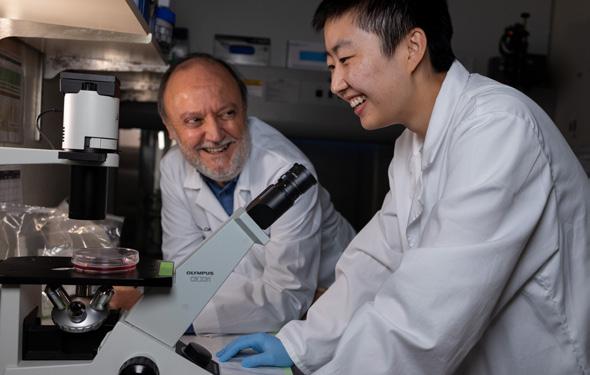


A yearly professional development workshop for clinical investigators at every experience level looking to increase clinical trial working knowledge, the Clinical Trials Development Workshop hosts speakers with a wide range of experience. The workshop is free to attend and hosted by the College of Medicine – Tucson.
Keep an eye out for the next workshop in the Events section of the Department of Medicine website at deptmedicine.arizona.edu


cancercenter.arizona.edu/ccgr
Cancer research only moves forward with collaboration. UACC hosts Collaborative Cancer Grand Rounds (CCGR) to facilitate nation wide collaboration by inviting speakers, both internal and external to the University of Arizona, to speak on their research. Lecture topics range from basic to clinical and from prevention and control, as well as the intersection of these subject areas. CCGR lectures are free to attend and intended for UACC members and their trainees and students.
Keep an eye out for the next CCGR in the Events section of the UACC website at cancercenter.arizona.edu/calendar.


The GLCBCRI Annual Symposium provides scientific programming with presentations by nationally recognized faculty who share their latest breast cancer research findings. The symposium provides an opportunity for GLCBCRI donors and those affected by breast cancer to stay up to date on the breast cancer research being done at the institute.
Keep an eye out for the next GLCBCRI Annual Symposium in the Events section of the UACC website at cancercenter.arizona.edu/calendar

This day long, in-person conference aims to inform, engage, and create opportunities to collaborate with other researchers and scientists in our common goal of curing cancer. UACC members share cutting-edge innovations from their research. The retreat is free to attend but requires registration.
The Scientific Retreat typically takes place in November. For a specific date, check the Events section of the UACC website as fall approaches: cancercenter.arizona.edu/calendar
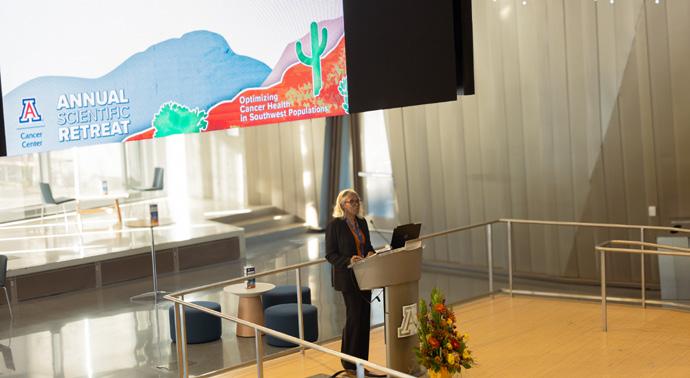
Applied Science: The study of how to use scientific discoveries to solve problems
Basic Science: The study of the foundations of the world and how things work, producing scientific discoveries
Cancer Control: Strategies for prevention, early detection, treatment, and palliative care that aim to reduce the frequency, morbidity, and mortality of cancer and to improve the quality of life in cancer patients through evidencebased interventions
Catchment Area: A requirement to be a NCI-desginated Comprehensive Cancer Center, a self-defined geographic area that each NCI-designated Cancer Center serves or intends to serve in the research in conducts, the communities it engages, and the outreach it performs
Clinical Trial: A research study that tests a medical, surgical, or behavioral intervention in people
Comprehensive Cancer Center: A designation from the NCI for a cancer research center that demonstrates reasonable depth and breadth of their research in basic, clinical, and/or prevention, cancer control, and population science, as well as substantial transdisciplinary research that bridges these scientific areas. In addition, these centers are effective in serving their catchment area through the cancer research they support and the cancer control activities they undertake. They also integrate training and education of biomedical researchers and community health care professionals
Core Facility: See Shared Resource
Early Career Faculty: See Early Stage Investigator
Early Career Investigator: See Early Stage Investigator
Early Stage Faculty: See Early Stage Investigator
Early Stage Investigators (ESI): A career classification by the NIH for Principal Investigators who have completed their research degree or post-graduate clinical training within the past 10 years and have not been awarded a substantial independent research grant from NIH
Junior Faculty: Faculty members who are typically in the early stages of their careers, often in the rank of Instructor or Assistant Professor
Junior Investigator (JI): See Junior Faculty
Morbidity: The burden of disease, including the experience of being ill; the presence of illness or disease within a population
Mortality: The number of deaths a disease causes
Palliative Care: Specialized medical care for individuals with serious illnesses that focuses on relieving symptoms and pain management to improve the quality of life of the individual
Population Science: The study of how to reduce disease, incidence and death, as well as how to increase the quality of life for all individuals
Postdoctorate: A period of research undertaken after the completion of a doctoral degree, often referred to as "postdocs"
Post-baccalaureate: A student who has graduated with a bachelor's degree; post-baccalaureate programs are typically for students who plan to apply for graduate degree programs, often referred to as "post-baccs"
Principal Investigator: The lead researcher responsible for overseeing a research project, grant, or clinical trial
Shared Resource: An asset or service that can be used by multiple researchers or groups; a centralized facility that provides access to specialized instruments, technologies, services, and/or expertise
Translational Science: Research aimed at translating the results in basic research into results that benefit humans; for example, utilizing basic science breakthroughs to create interventional drug treatments for illnesses
Transdisciplinary Research: Research that bridges multiple disciplines; for example, a researcher is studying the effectiveness of a cancer drug treatment works with a population scientist to study the willingness for patients to use the drug treatment
ACS: American Cancer Society
CaCTES: Cancer Center Teacher Education Summer Program
CBP: Cancer Biology Program (research program at the University of Arizona Cancer Center)
COM-P: College of Medicine-Phoenix (at the University of Arizona)
COM-T: College of Medicine-Tucson (at the University of Arizona)
CPCP: Cancer Prevention and Control Program (research program at the University of Arizona Cancer Center)
CRTEC: Cancer Research Training and Education Coordination office (at the University of Arizona Cancer Center)
CTOP: Clinical and Translational Oncology Program (research program at the University of Arizona Cancer Center)
ESI: Early Stage Investigator
FAR: F Award Readiness Program
GLCBCRI: Ginny L. Clements Breast Cancer Research Institute (at the University of Arizona Cancer Center)
IRG: Institutional Review Grant Program
JI: Junior Investigator
KAR: K Award Readiness Program
MOTER: Mobile Oncology Training, Education, and Recruitment Program
NACP: Partnership for Native American Cancer Prevention (at the University of Arizona Cancer Center and Northern Arizona University)
NCI: National Cancer Institute
NIH: National Institute of Health
OSI: Oncology Summer Internship
SASS: Students are Sun Safe
SCI: Skin Cancer Institute (at the University of Arizona Cancer Center)
SR: Shared Resource
STEM: Science, Technology, Engineering, Mathematics
UACC: University of Arizona Cancer Center
UG: Undergraduate
USIP: Undergraduate Summer Internship Program
Winn CIPP: Robert A. Winn Clinical Investigator Pathway Program
For a list of program acronyms, see the Table of Contents
Acknowledgments: Thank you to program staff and leaders across the University of Arizona for providing and editing information and sharing photos of your programming. Thank you to the Communications team at the University of Arizona Cancer Center for providing additional photos. Arizona state and virtual icons provided by Flaticon.com.
We gratefully acknowledge Zoe Malin for her original work in designing and writing this brochure.
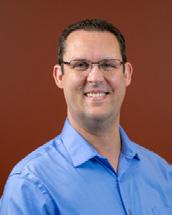
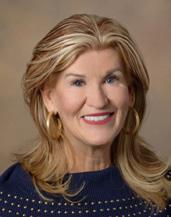
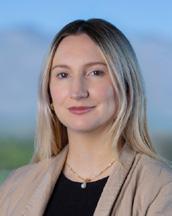
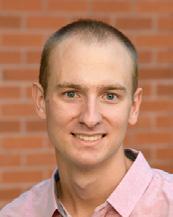
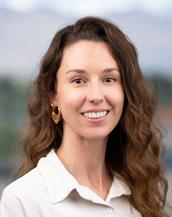
Jacob Schwartz, PhD
Associate Research Professor, Pharmacology
Associate Director, CRTEC
Carol Carpenter
Principal Research Administrator & Grant Writer
Megan McKay Academic Programs Officer
Dylan Miller, MPH
Senior Program Coordinator, Skin Cancer Institute
Jayleigh Parker Program Coordinator